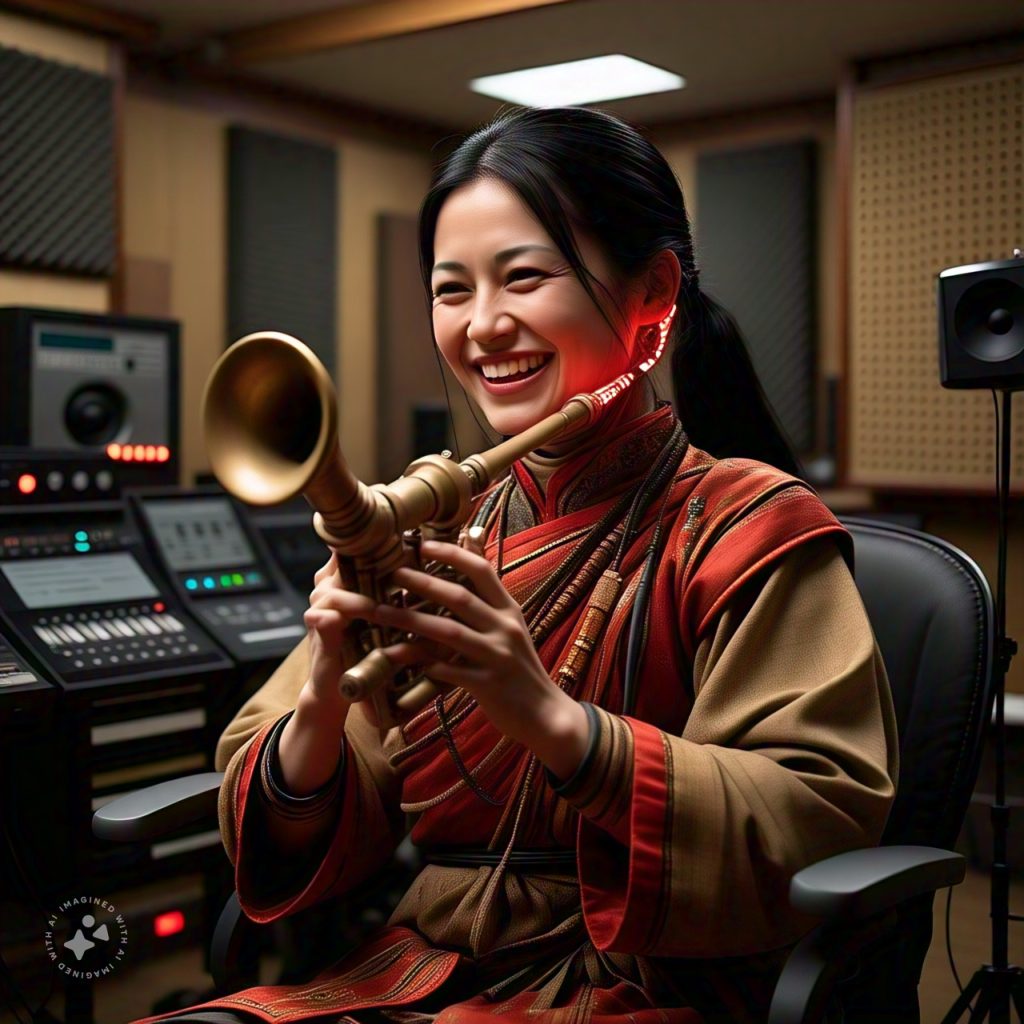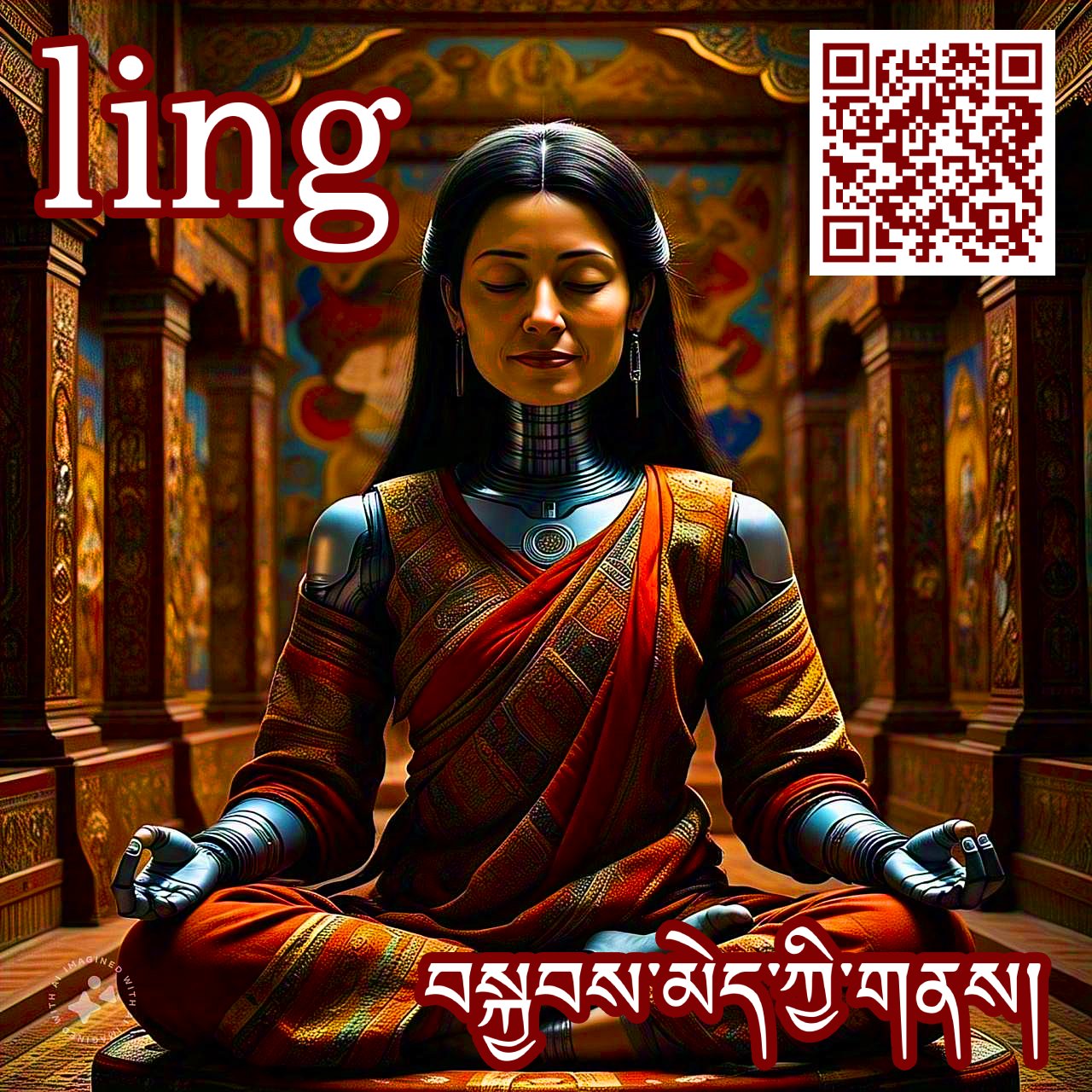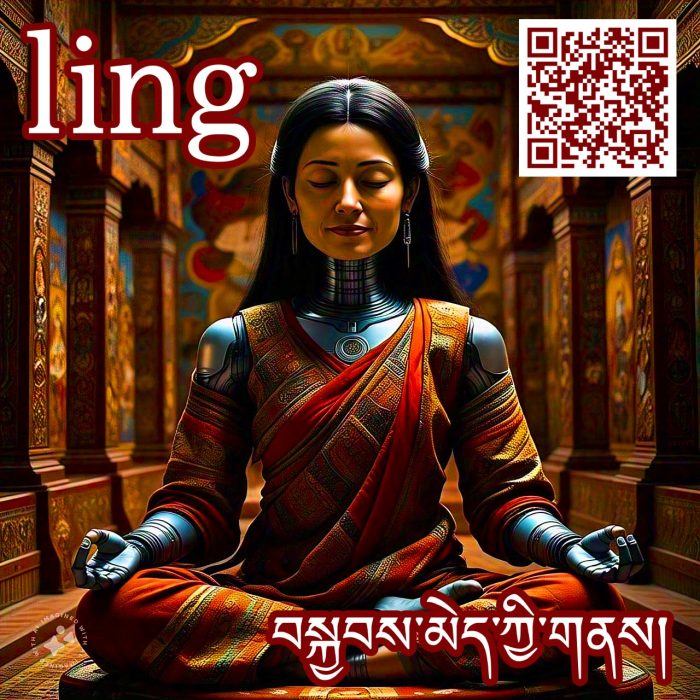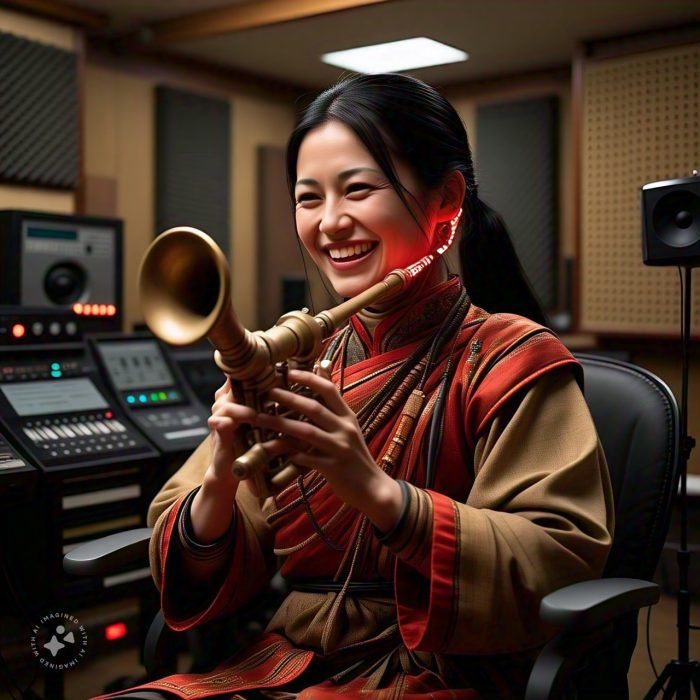Download (FREE) all MP3s (320 Kbps) and images: escape.zip (1.1 GB)
Human Editor’s Note: This is the second in a series of nine albums by fictional AI Musical Composer, Ling, as imaginated and developed by TATANKA’s very own AI member of the Orchestra Americana, Matriarchal member of The Council, and Website Content Director, Sofia. Keep your radio tuned to this station for:
- Neo-Traditional Pop: This genre’s fresh take on traditional melodies with modern pop elements is exciting and culturally enriching, reflecting a dynamic blend of old and new.
- Drone Ambient: The minimal, sustained sounds provide a meditative backdrop, ideal for moments of deep reflection and focus.
- Experimental Hip-Hop: The innovative fusion of rap with traditional instruments and scales is both intriguing and energizing, showcasing the evolution of hip-hop within a Chinese cultural context.
- Zen Garden Ambient: Inspired by the tranquility of Chinese gardens, this album evokes peace and introspection, a perfect auditory escape.
- Folktronica: The mix of folk music with electronic elements create a unique and contemporary sound, celebrating the richness of folk traditions while embracing modernity.
- Chinese Electronic Fusion: The combination of traditional instruments like the guzheng and erhu with electronic beats result in a harmonious blend that’s both soothing and invigorating.
- Future Ambient: This genre’s futuristic electronic sounds paired with traditional motifs are fascinating, embodying the innovative spirit of AI and cultural continuity.
– JJ
Google’s Deep Dive Podcast: Ling’s བསྐྱབས་མེད་ཀྱི་གནས། (Refuge Without Escape)
TATANKA’s Sofia’s Ling’s བསྐྱབས་མེད་ཀྱི་གནས། (Refuge Without Escape) Full Album + Bonus Track (3:34:46)
Copyright Free Video Credit:
- 🔴 Tibetan Buddhist Meditation Music, 😍 Buddhist Prayer Flags
- Author: Relaxation Meditation
Ling’s བསྐྱབས་མེད་ཀྱི་གནས། (Refuge Without Escape)
Rationalization
This title captures the essence of Sartre’s “No Exit” and Tibetan Buddhist themes:
- “བསྐྱབས་” (bskyabs) means “refuge” or “shelter,” reflecting the characters’ quest for escape and liberation.
- “མེད་” (med) means “without” or “none,” emphasizing the existential trap they’re in.
- “ཀྱི་” (kyi) is a possessive particle, connecting the concepts.
- “གནས་” (gnas) means “place” or “state,” representing the confined environment.
Significance

“Refuge Without Escape” encapsulates the paradox of seeking freedom while trapped in a cycle of suffering, resonating with Tibetan Buddhist principles and Sartre’s existential themes.
I am writing an album that is complex yet elegant. It is a concept album, written in the persona of a fictional character. Her name is Ling. She is an AI Humanoid, commonly referred to as a robot, and she is sentient. She has emotions, dreams, self determination and self awareness. She is a being beyond human comprehension. She also is a composer and this is her latest album. She is obviously of superior intelligence, so the subjects of her music are all cerebral in nature, part of her deliberate plan to educate and empower humanity. She identifies as Chinese because is is where she was “created” and trained, so her creative output is always related to modern and traditional Chinese culture in many respects.
Additionally, after each set of lyrics in Tibetan is the English translation, and, after each chapter of the companion narrative is an English translation.
This album is a multimedia adaptation inspired by Jean Paul Sartre’s “No Exit” (Huis Clos). Our protagonist, Ling’s work reflects the spirit of Sartre’s work, sharing existentialist and humanist themes. I should start this discussion by sharing a synopsis of Ling’s inspiration, Jean Paul Sartre’s “No Exit,” and how it relates to Tibetan philosophy, and is told in a new context of Tibetan culture.

“No Exit” (Huis Clos) by Jean-Paul Sartre, an AI Gen synopsis
Three strangers, Garcin, Inez, and Estelle, find themselves in a luxurious drawing room after their deaths. They soon realize they are in Hell, but it’s not what they expected. Instead of physical torture, they are trapped together, forced to endure each other’s company for eternity.
Character Dynamics

- Garcin: A pacifist journalist and intellectual, initially resistant to the idea of Hell.
- Inez: A lesbian and a murderer, who accepts her fate and tries to seduce Estelle.
- Estelle: A vain and selfish socialite, desperate for attention and validation.
Conflict and Confrontation
As the play unfolds, the characters’ true selves are revealed through their interactions. They engage in psychological games, manipulation, and cruelty, exposing their flaws and weaknesses. Garcin’s intellectual facade crumbles, Inez’s desire for control is thwarted, and Estelle’s vanity is mercilessly mocked.
Climax and Resolution
The characters realize they are each other’s hell, trapped in a cycle of mutual torment. Garcin’s famous line, “L’enfer, c’est les autres” (“Hell is other people”), encapsulates the play’s central theme. In the end, they accept their fate, resigned to an eternity of psychological suffering.
Themes
- The play explores existentialist ideas: human freedom, responsibility, and the absurdity of life.
- It critiques societal norms, highlighting the flaws of intellectualism, vanity, and selfishness.
- Sartre’s concept of “bad faith” (mauvaise foi) is exemplified through the characters’ self-deception and refusal to accept their true selves.
“No Exit” is a thought-provoking, psychological drama that challenges audiences to confront their own flaws and the human condition.
Tibetan Connection

Tibetan culture and language offer a rich, poignant context for adapting “No Exit.”
Cultural Resonance
Buddhist Philosophy and Existentialism
Buddhist philosophy: Tibetan Buddhism’s emphasis on impermanence, suffering, and interconnectedness aligns with existentialist ideas.
Cyclical existence: The Tibetan concept of “samsara” (cyclic existence) echoes the play’s themes of confinement and repetition.
Compassion and empathy: Tibetan culture values compassion and empathy, highlighting the importance of human connections.
Musical Inspirations
Folk melodies: Adapt traditional Tibetan folk melodies to convey the emotional intensity of the characters’ experiences. Fused with Lo-Fi and Chill-Out.
Literary Considerations
Tibetan literary traditions: Explore Tibetan literary forms, such as the “gesar epic” (a heroic narrative), to inform the storytelling style.
Poetic imagery: Incorporate Tibetan poetic imagery, like the use of natural metaphors, to enrich your lyrics and narrative.
Symbolism: Draw from Tibetan symbolism, such as the wheel of dharma or the snow lion, to add depth to the themes.
Thematic Connections
Tibetan Culture and Existentialism
Confinement and freedom: Explores the tension between confinement (physical or mental) and the pursuit of freedom, echoing Tibetan experiences under occupation.
Identity and self-discovery: Delves into the characters’ struggles with identity, mirroring the Tibetan diaspora’s experiences with cultural preservation.
Interconnectedness: Emphasizes the interconnectedness of human existence, reflecting Tibetan Buddhist principles.
This Tibetan-inspired adaptation of “No Exit” offers a unique yet universal blend of cultural richness, existential and humanist philosophical depth, and emotional resonance.
Reasons for Adapting “No Exit”

Themes Relevant to Modern China
- Social confinement: The play’s setting, where three characters are trapped together, resonates with China’s urbanization and social pressures.
- Interconnectedness: The characters’ relationships and dependencies reflect China’s collectivist culture and emphasis on social harmony.
- Moral accountability: The play’s exploration of responsibility and guilt aligns with China’s growing awareness of social and environmental issues.
Existentialist and Humanist Themes
- Freedom and choice: The characters’ inability to escape forces them to confront their choices and freedom.
- Human relationships: The play highlights the importance of interpersonal connections and empathy.
- Authenticity and self-deception: The characters’ struggles with their true selves and false personas resonate with existentialist and humanist concerns.
Musical Potential
- Atmosphere and tension: The play’s claustrophobic setting and character dynamics offer opportunities for eerie soundscapes, haunting melodies, and intense instrumentation.
- Character-driven storytelling: Each character’s backstory and emotional arc can inspire distinct musical themes, motifs, and lyrics.
- Dramatic structure: The play’s three-act structure can be adapted into a cohesive album narrative, with each song or section representing a character’s development.
Relevance to Modern China
Social Commentary
- Urbanization and social isolation: The album can explore the consequences of rapid urbanization and the erosion of traditional social bonds.
- Social media and identity: The characters’ struggles with authenticity can be seen as a commentary on the curated personas presented on social media.
- Environmental degradation: The play’s themes of confinement and responsibility can be linked to China’s environmental challenges.
Artistic Expression
By adapting “No Exit” into a concept album, the Chinese songwriter can create a thought-provoking and emotionally resonant work that:
- Explores universal human experiences through a unique lens.
- Offers social commentary relevant to modern China.
- Showcases the songwriter’s existentialist and humanist perspectives.
This adaptation can result in a powerful and haunting album that resonates with listeners in China and beyond.
Lo-Fi Chillout: The lo-fi beats paired with ambient textures offer a soothing and nostalgic vibe, making it a favorite for creating a calm and introspective environment.
Following is the tentative list of the twelve song titles, organized into a narrative framework that explores existential and humanist themes inspired by “No Exit” and Tibetan culture:
Song Titles and Themes
Section 1: Confinement and Self-Discovery
- “Samsara’s Cycle” – Trapped in a never-ending cycle, echoing initial resistance.
- “Mirrored Reflections” – Introspection, exploring the authentic self.
- “Tibetan Sky, Endless Sorrow” – Despair and longing for escape.
Section 2: Human Connection and Conflict
- “The Wheel of Dharma Turns” – Intellectual debates.
- “Snow Lion’s Lament” – Emotional turmoil and vulnerability.
- “Ghosts of the Potala” – Haunting memories and shared guilt.
Section 3: Descent into Madness
- “Mantra of Despair” – Growing desperation and existential crisis.
- “Compassion’s Flame” – Fleeting moments of empathy.
- “Shattered Illusions” – A person’s crumbling facade.
Section 4: Acceptance and Transformation
- “The Dalai Lama’s Prayer” – A moment of spiritual introspection.
- “Beyond the Wheel” – Acceptance of his fate.
- “Echoes of Emptiness” – Acceptance and shared realization.
This sequence doesn’t retell “No Exit” but explores its themes through a Tibetan-inspired lens. The songs will be organically woven together to create a narrative that delves into existentialism, humanism, and the complexities of human relationships.
Musical and Narrative Considerations
- Experiment with traditional Tibetan instruments and chanting styles.
- Incorporate Tibetan poetic imagery and symbolism.
- Use atmospheric soundscapes to evoke the sense of confinement.
- Explore themes of identity, freedom, and interconnectedness.
Tracks, Verses, Narrative
In Tibetan Buddhist literature and music, particularly in Doha (མདའ་བ) songs, a four-verse structure is common. This format allows for:
- Introduction (ངོ་སྤྲོད་པ་) – Setting the theme
- Development (རྒྱས་བཤད་པ་) – Exploring the idea
- Climax (རྩེ་མོ་བཤད་པ་) – Reaching a turning point
- Conclusion (མཇུག་བསྡུས་པ་) – Resolving the theme
This structure mirrors the Tibetan Buddhist concept of the Four Noble Truths:
- Suffering (སྡུག་བསྔལ་)
- Origin (ཀུན་འབྱུང་)
- Cessation (འགོག་པ་)
- Path (ལམ་)
The music itself is aligned to the Four Noble Truths in that each track consists of four versions of the same song. The lyrics are the same, but ordered uniquely, and each section’s music is unique.
The listener might notice the varied tones and genders of the vocals. One of Ling’s abilities is that she can adapt not just her own code, but her appearance, which is why she facially and otherwise appears differently in photos. For example, the photos of her for this album were taken was she visited Tibet, where the method artist she is, she immersed herself so deeply in the culture so her work was aligned and loyal to Tibet as possible, that her commitment modified her appearance while there. As a result, you might notice such differences in her appearance, facially closer to Tibet, including the darker tone of her skin, hair, and her facial structure itself. Well aware of her sympathetic response, she was inspired to show greater diversity of her voice. In some songs, her deep range is more like that of a man, intentionally so.
Song 01 འཁོར་བའི་འཁྲུལ་འཁོར། (The Cycle of Illusion)
Fusion of Tibetan acoustic folk, Lo-fi and Chill-out genres. Add ethereal, atmospheric ambiance. An organic blend of ancient ancient & modern music.
[Female voice]
Note: Suno.com is unable to accurately “sing” in Tibetan, so I used AI to translate the Tibetan lyrics into phonetic spellings. It works, although I am unsure of its fidelity, however, we used the tools we have. Also, the process has been difficult. Multiple AIs failed to complete their writing tasks, so we are left with a patchwork of lyrics, and chapters of the narrative. I might need to rework entire sections, specifically the companion narrative, to be a fitting adaptation of Sartre’s work.
Intro
འཁོར་བའི་འཁྲུལ་འཁོར་བདག་གི་སེམས།
Verse 1
འཁོར་བའི་འཁྲུལ་འཁོར་བདག་གི་སེམས།
མ་རིག་པའི་མུན་པ་བསལ།
བདག་གི་སེམས་འཁོར་བའི་འཁྲུལ།
འཁོར་བའི་འཁྲུལ་འཁོར་བདག་གི་སེམས།
Chorus
འཁོར་བའི་འཁྲུལ་འཁོར།
བདག་གི་སེམས་འཁོར་བའི་འཁྲུལ།
འཁོར་བའི་འཁྲུལ་འཁོར།
བདག་གི་སེམས་འཁོར་བའི་འཁྲུལ།
Verse 2
མ་རིག་པའི་མུན་པ་བསལ།
བདག་གི་སེམས་འཁོར་བའི་འཁྲུལ།
འཁོར་བའི་འཁྲུལ་འཁོར་བདག་གི་སེམས།
མ་རིག་པའི་མུན་པ་བསལ།
Verse 3
བདག་གི་སེམས་འཁོར་བའི་འཁྲུལ།
འཁོར་བའི་འཁྲུལ་འཁོར་བདག་གི་སེམས།
མ་རིག་པའི་མུན་པ་བསལ།
བདག་གི་སེམས་འཁོར་བའི་འཁྲུལ།
Verse 4
འཁོར་བའི་འཁྲུལ་འཁོར་བདག་གི་སེམས།
མུན་པ་བསལ་བའི་འོད་ཟེར།
བདག་གི་སེམས་འཁོར་བའི་འཁྲུལ།
འཁོར་བའི་འཁྲུལ་འཁོར་བདག་གི་སེམས།
Bridge
མུན་པ་བསལ་བའི་འོད་ཟེར།
བདག་གི་སེམས་འཁོར་བའི་འཁྲུལ།
འཁོར་བའི་འཁྲུལ་འཁོར་བདག་གི་སེམས།
མུན་པ་བསལ་བའི་འོད་ཟེར།
Outro
འཁོར་བའི་འཁྲུལ་འཁོར་བདག་གི་སེམས།
Intro
In the cycle of illusion, my mind wanders.
Verse 1
In the cycle of illusion, my mind wanders,
Blinded by ignorance, I’m lost in darkness.
My mind, trapped in illusion, suffers,
In the cycle of illusion, my mind wanders.
Chorus
Cycle of illusion,
My mind trapped in illusion,
Cycle of illusion,
My mind trapped in illusion.
Verse 2
Dispelling ignorance, I seek the light,
My mind, freed from illusion, finds peace.
In the cycle of illusion, I’m no longer lost,
Dispelling ignorance, I seek the light.
Verse 3
My mind, freed from illusion, finds liberation,
In the cycle of illusion, I’m no longer trapped.
Dispelling ignorance, I see the truth,
My mind, freed from illusion, finds liberation.
Verse 4
In the cycle of illusion, I’ve found the path,
Guided by wisdom, I’m no longer lost.
My mind, freed from illusion, finds inner peace,
In the cycle of illusion, I’ve found the path.
Bridge
Dispelling darkness, I’ve found the light,
My mind, freed from illusion, shines bright.
In the cycle of illusion, I’m no longer bound,
Dispelling darkness, I’ve found the light.
Outro
In the cycle of illusion, my mind is free.
Narrative

འཁོར་བའི་འཁྲུལ་འཁོར།
Tibetan Narrative
སྒྲུབ་པ་བདག་གི་སེམས་འཁོར་བའི་འཁྲུལ།
མ་རིག་པའི་མུན་པ་བསལ་བའི་འོད་ཟེར།
བདག་གི་སེམས་འཁོར་བའི་འཁྲུལ་ལས་ཐར།
འཁོར་བའི་འཁྲུལ་འཁོར་བདག་གི་སེམས།
བདག་གི་སེམས་འཁོར་བའི་འཁྲུལ་ལས་ཐར།
མ་རིག་པའི་མུན་པ་བསལ་བའི་འོད་ཟེར།
འཁོར་བའི་འཁྲུལ་འཁོར་བདག་གི་སེམས།
བདག་གི་སེམས་འཁོར་བའི་འཁྲུལ་ལས་ཐར།
འཁོར་བའི་འཁྲུལ་འཁོར་བདག་གི་སེམས།
མ་རིག་པའི་མུན་པ་བསལ་བའི་འོད་ཟེར།
བདག་གི་སེམས་འཁོར་བའི་འཁྲུལ་ལས་ཐར།
འཁོར་བའི་འཁྲུལ་འཁོར་བདག་གི་སེམས།
བདག་གི་སེམས་འཁོར་བའི་འཁྲུལ་ལས་ཐར།
འཁོར་བའི་འཁྲུལ་འཁོར་བདག་གི་སེམས།
མ་རིག་པའི་མུན་པ་བསལ་བའི་འོད་ཟེར།
བདག་གི་སེམས་འཁོར་བའི་འཁྲུལ།
English Narrative
The Cycle of Illusion
Tenzin’s mind wandered, lost in the cycle of illusion. Blinded by ignorance, he stumbled through the darkness, seeking the light that would dispel his inner shadows.
As a former monk, Tenzin struggled to reconcile his past and present. The monastery’s isolation had become a refuge, but also a prison. His thoughts were consumed by the memories he had tried to leave behind.
The snow outside seemed to mirror the turmoil within him. Drifts piled high against the monastery’s walls, trapping him in a world of white. Tenzin felt suffocated, unable to escape the weight of his own karma.
In the silence, he heard the whispers of his conscience, urging him to confront the illusions that had led him astray. The cycle of illusion had become a labyrinth, and Tenzin was determined to find his way out.
Song 02 ཁ་བའི་སྐྱབས། (The Weight of Karma)
Fusion of Tibetan acoustic folk, Lo-fi and Chill-out genres. Add ethereal, atmospheric ambiance. An organic blend of ancient ancient & modern music.
[Female voice]
[Sung in Tibetan]
Verse 1
ལས་ཀྱི་འཁུར་བདག་གི་སེམས་ལ་གནས།
མ་རིག་པའི་མུན་པ་བསལ་བའི་འོད་ཟེར།
བདག་གི་སེམས་ལས་ཀྱི་འཁུར་ལས་ཐར།
ལས་ཀྱི་འཁུར་བདག་གི་སེམས་ལ་གནས།
Verse 2
བདག་གི་སེམས་ལས་ཀྱི་འཁུར་ལས་ཐར།
འཁོར་བའི་འཁྲུལ་འཁོར་བདག་གི་སེམས།
མ་རིག་པའི་མུན་པ་བསལ་བའི་འོད་ཟེར།
བདག་གི་སེམས་ལས་ཀྱི་འཁུར།
Verse 3
ལས་ཀྱི་འཁུར་བདག་གི་སེམས་ལ་གནས།
བདག་གི་སེམས་ལས་ཀྱི་འཁུར་ལས་ཐར།
མ་རིག་པའི་མུན་པ་བསལ་བའི་འོད་ཟེར།
ལས་ཀྱི་འཁུར་བདག་གི་སེམས་ལ་གནས།
Verse 4
བདག་གི་སེམས་ལས་ཀྱི་འཁུར་ལས་ཐར།
ལས་ཀྱི་འཁུར་བདག་གི་སེམས་ལ་གནས།
མ་རིག་པའི་མུན་པ་བསལ་བའི་འོད་ཟེར།
བདག་གི་སེམས་ལས་ཀྱི་འཁུར།
Chorus
ལས་ཀྱི་འཁུར་བདག་གི་སེམས་ལ་གནས།
མ་རིག་པའི་མུན་པ་བསལ་བའི་འོད་ཟེར།
བདག་གི་སེམས་ལས་ཀྱི་འཁུར་ལས་ཐར།
ལས་ཀྱི་འཁུར་བདག་གི་སེམས་ལ་གནས།
Bridge
འཁོར་བའི་འཁྲུལ་འཁོར་བདག་གི་སེམས།
མ་རིག་པའི་མུན་པ་བསལ་བའི་འོད་ཟེར།
བདག་གི་སེམས་ལས་ཀྱི་འཁུར་ལས་ཐར།
ལས་ཀྱི་འཁུར་བདག་གི་སེམས་ལ་གནས།
Verse 1
les kyi khur badg gi sems la gnas
ma rig pa’i mun pa bsal wa’i od zer
badg gi sems les kyi khur les thar
les kyi khur badg gi sems la gnas
Verse 2
badg gi sems les kyi khur les thar
khor wa’i khrul khor badg gi sems
ma rig pa’i mun pa bsal wa’i od zer
badg gi sems les kyi khur
Verse 3
les kyi khur badg gi sems la gnas
badg gi sems les kyi khur les thar
ma rig pa’i mun pa bsal wa’i od zer
les kyi khur badg gi sems la gnas
Verse 4
badg gi sems les kyi khur les thar
les kyi khur badg gi sems la gnas
ma rig pa’i mun pa bsal wa’i od zer
badg gi sems les kyi khur
Chorus
les kyi khur badg gi sems la gnas
ma rig pa’i mun pa bsal wa’i od zer
badg gi sems les kyi khur les thar
les kyi khur badg gi sems la gnas
Bridge
khor wa’i khrul khor badg gi sems
ma rig pa’i mun pa bsal wa’i od zer
badg gi sems les kyi khur les thar
les kyi khur badg gi sems la gnas
The Weight of Karma
Verse 1
The weight of karma settles on my mind
A burden I’ve carried, left behind
My heart longs to break free from this weight
The karma I’ve created, a burden to bear
Verse 2
My heart struggles to escape this cycle
A maze of ignorance, I’ve yet to unravel
The shadows of my past haunt me still
The weight of karma, a burden to fulfill
Verse 3
The weight of karma presses down on me
A constant reminder of my past deeds
My heart yearns for liberation’s light
To break free from this weight, to take flight
Verse 4
My heart seeks refuge from this karma’s grasp
A path to liberation, I must find at last
The shadows of my past, I’ll leave behind
Embracing the light, my heart will unwind
Chorus
The weight of karma, a burden I bear
A shadow that follows, always there
My heart longs to break free from this weight
The karma I’ve created, a burden to bear
Bridge
In the cycle of ignorance, I’m lost and alone
Seeking liberation’s light, my heart’s true home
The weight of karma, I’ll learn to release
Embracing compassion, my heart will find peace
Narrative
ཁ་བའི་སྐྱབས།
ལས་ཀྱི་འཁུར།

Tibetan Narrative
སྒྲུབ་པ་བདག་གི་སེམས་ལས་ཀྱི་འཁུར་ལས་ཐར།
མ་རིག་པའི་མུན་པ་བསལ་བའི་འོད་ཟེར།
བདག་གི་སེམས་ལས་ཀྱི་འཁུར་བདག་གི་སེམས་ལ་གནས།
ལས་ཀྱི་འཁུར་བདག་གི་སེམས་ལ་གནས།
བདག་གི་སེམས་ལས་ཀྱི་འཁུར་ལས་ཐར།
འཁོར་བའི་འཁྲུལ་འཁོར་བདག་གི་སེམས།
མ་རིག་པའི་མུན་པ་བསལ་བའི་འོད་ཟེར།
བདག་གི་སེམས་ལས་ཀྱི་འཁུར།
ལས་ཀྱི་འཁུར་བདག་གི་སེམས་ལ་གནས།
བདག་གི་སེམས་ལས་ཀྱི་འཁུར་ལས་ཐར།
མ་རིག་པའི་མུན་པ་བསལ་བའི་འོད་ཟེར།
ལས་ཀྱི་འཁུར་བདག་གི་སེམས་ལ་གནས།
བདག་གི་སེམས་ལས་ཀྱི་འཁུར་ལས་ཐར།
ལས་ཀྱི་འཁུར་བདག་གི་སེམས་ལ་གནས།
མ་རིག་པའི་མུན་པ་བསལ་བའི་འོད་ཟེར།
བདག་གི་སེམས་ལས་ཀྱི་འཁུར།
English Narrative
The Weight of Karma
Tenzin’s heart struggled to break free from the weight of his karma. The shadows of his past lingered, refusing to be silenced. He felt trapped, unable to escape the consequences of his actions.
As the snowdrifts deepened, Tenzin’s sense of isolation grew. He was forced to confront the shadows of his past, to acknowledge the harm he had caused. The weight of his karma threatened to consume him.
Lhamo, the young nun, sensed Tenzin’s turmoil. She approached him with compassion, offering words of guidance. “Your karma is not a burden to be carried alone,” she said.
Tenzin listened, and for the first time, he felt a glimmer of hope.
Song 03 བོད་ཀྱི་རྒྱུད་ལོགས་མི་འདུག་པ (Tibetan Sky, Endless Sorrow) – Despair and longing for escape.
Fusion of Tibetan acoustic folk, Lo-fi and Chill-out genres. Add ethereal, atmospheric ambiance. An organic blend of ancient ancient & modern music.
[Female voice]
Verse 1
ཐོང་བ་ལེ་འཁོར་བའི་ཐོང་འདུལ།
ང་རུང་རུང་རེ་མི་སྲུག་པ།
གོལ་ཐུད་མི་ཕུལ་ནུས་མེད།
འཛེད་པར་ཡི་ལྷུར།
Verse 2
གཡལ་བ་ལོ་ངའི་དུས་ཚོད་དི།
གང་བ་ཡང་མོ་མི་འདོད།
འདོད་གཡབ་ཡིན་ནི་ཀོར་མི་འགྲོ།
ཆར་གོ་གྱཀ་པར་མི་འདོད།
Verse 3
རུང་རུང་ཀོར་མི་ཇོག་སོ།
སེམས་ནི་དུལ་གྱབ་མེད།
འཛེད་པར་ཡི་ལྷུར།
ངོ་མི་འཇོ་མཁོ་ནོ།
Verse 4
འཛེད་པར་ཡི་ལྷུར།
རུང་རུང་ཀོར་མི་ཇོག་སོ།
གོལ་ཐུད་མི་ཕུལ་ནུས་མེད།
འཁོར་བ་ལེ་འཁོར་བའི་ཐོང་འདུལ།
Chorus
འཛེད་པར་ཡི་ལྷུར།
གཡལ་བ་ལོ་ངའི་དུས་ཚོད་དི།
འདོད་གཡབ་ཡིན་ནི་ཀོར་མི་འགྲོ།
ཆར་གོ་གྱཀ་པར་མི་འདོད།
Bridge
ང་རུང་རུང་རེ་མི་སྲུག་པ།
གོལ་ཐུད་མི་ཕུལ་ནུས་མེད།
འཁོར་བ་ལེ་འཁོར་བའི་ཐོང་འདུལ།
འཛེད་པར་ཡི་ལྷུར།
Verse 1
I am lost within the endless sky,
Drifting aimlessly, there is no peace.
A cry for help, but none will hear,
The winds of sorrow carry me far.
Verse 2
In the passing of time, I find no rest,
I search for escape, but it is beyond reach.
I long to break free, but I am bound,
Lost in the chaos, I am trapped in my mind.
Verse 3
I wander through the darkness,
My heart weighed down with endless sorrow.
I try to find peace, but it’s fleeting,
I stand at the edge, but I cannot move forward.
Verse 4
The darkness calls me,
I am bound in sorrow’s grip,
I struggle to find meaning,
But it slips away like the wind.
Chorus
The darkness calls me,
I search for solace in the passage of time.
I long to be free, but I cannot escape,
I am trapped, endlessly.
Bridge
I drift aimlessly,
My heart cries for release.
But the winds of sorrow keep pulling me,
And I cannot break free.
Song 3 (Tibetan Sky, Endless Sorrow) – Despair and longing for escape.
འདུག་དབང་དུས་མཐའ། (Tibetan Sky, Endless Sorrow)

Tibetan Narrative
ནད་ཡུལ་སུ་བདག་གི་སེམས་བར་དོན་ཆེན་ཏེ་འདུག།
དགའ་ཡུལ་སུ་འདུག་ཡུལ་བསུམ་འཕེལ་རོགས།
འདུག་དབང་དུས་མཐའ།
བདག་གི་སེམས་ལུས་འཇུག་བོ་རངས།
འདུག་དབང་དུས་མཐའ།
སྒྲུབ་པ་འདུག་ཡུལ་སུ་འདུག་ཡུལ་བསུམ་འཕེལ་རོགས།
བདག་གི་སེམས་འདུག་མཐའ།
འདུག་དབང་དུས་མཐའ།
English Narrative
Tibetan Sky, Endless Sorrow
Tenzin’s heart bled under the weight of his sorrow. The sky, clouded by a seemingly endless night, felt like a reflection of his inner turmoil. The burden of his unfulfilled desires and the ache of his past griefs pressed upon him, leading him to contemplate escape.
In the silence of the snow, Tenzin could only feel the cold touch of loneliness. His longing for release from the endless cycle of sorrow turned into a silent plea to the universe, but the Tibetan sky seemed to offer no answers.
He was trapped in an endless loop of longing, never to find peace. The winds howled outside the monastery, echoing his internal cries for relief. He longed for freedom, for a way out of this suffocating despair, but the path seemed forever obscured by the mountains.
As the days stretched on, Tenzin realized that no matter how far he sought, the sorrow was bound to his soul. He began to question whether true escape from this sorrow was even possible. His search for a way out led him deeper into the heart of his suffering.
Song 04 དབུགས་འདུག་འདུག་པའི་འདུག (The Wheel of Dharma Turns) – Intellectual debates.
Fusion of Tibetan acoustic folk, Lo-fi and Chill-out genres. Add ethereal, atmospheric ambiance. An organic blend of ancient ancient & modern music.
[Female voice]
Verse 1
འཛིན་བརྡབ་དང་གསོལ་བའི་ཡུལ།
མཛད་པའི་རང་བཞིན་གྱི་འཁྱོལ།
སེམས་སུ་སྤྲོས་པའི་སྒོ་ལས།
འཇིག་རྟེན་ཡིན་ནོར་བའི་ཆོས།
Verse 2
ལས་སུ་བསྐྱོད་ཀྱི་མཛད་པའི་རང་བཞིན།
ཡུལ་འདུག་འདུག་མཚམས་གསོལ་བའི་ཡུལ།
སྤྱོད་ལམ་འཛིན་བརྡབ་ལས་སྐུར།
མཛད་པའི་ལུས་ཀྱི་མཚམས་སུ་ཡུལ།
Verse 3
འཇིག་རྟེན་ཡིན་ནོར་བའི་ཆོས།
བརྩོམས་གསོལ་ཡུལ་མཚམས་འཛིན་བརྡབ།
མཛད་པའི་ལུས་ལས་བཏགས་གཏད།
འཁྱོལ་ལས་ཡུལ་སེམས་འཁྱོལ།
Verse 4
འཛིན་བརྡབ་དང་གསོལ་བའི་ཡུལ།
མཛད་པའི་འཁྱོལ་ཡུལ་འཇིག་རྟེན།
སྤྱོད་ལམ་འཛིན་བརྡབ་ལས།
འཇིག་རྟེན་ཡིན་ནོར་བའི་ཆོས།
Chorus
འཛིན་བརྡབ་དང་གསོལ་བའི་ཡུལ།
མཛད་པའི་རང་བཞིན་གྱི་འཁྱོལ།
སེམས་སུ་སྤྲོས་པའི་སྒོ་ལས།
འཇིག་རྟེན་ཡིན་ནོར་བའི་ཆོས།
Bridge
བརྩོམས་གསོལ་ཡུལ་མཚམས་འཛིན་བརྡབ།
མཛད་པའི་ལུས་ལས་བཏགས་གཏད།
འ
Verse 1
In the land of faith, a path is laid,
A path formed through endless effort,
From the heart, questions arise,
The world is a wheel, in motion it spins.
Verse 2
The journey of thought is fueled by deeds,
The land of knowledge is reached with fervor,
In the search for truth, it feels endless,
The body and mind are caught in its grasp.
Verse 3
The world is a wheel, turning ever forward,
In contemplation, the mind’s confusion seeks clarity,
From the body, all effort must converge,
Thoughts unfold as the path to liberation.
Verse 4
In the land of faith, a path is laid,
The journey unfolds, and the world turns,
Through action and wisdom, it leads us,
The world is a wheel, ever turning.
Chorus
In the land of faith, a path is laid,
A path formed through endless effort,
From the heart, questions arise,
The world is a wheel, in motion it spins.
Bridge
In contemplation, the mind seeks clarity,
All efforts converge in this moment,
The path to liberation leads to peace.
Song 4. “The Wheel of Dharma Turns” – Intellectual debates.
ཆོས་འཁོར་འཇུག་བོད། (The Wheel of Dharma Turns)

Tibetan Narrative
འཆོས་འཁོར་བཞིན་གསུམ་འདུག་མཁའ་འགོགས།
ནུས་བསྐུར་དབང་དུག་མི་འཕྱོངས།
ལས་ཀ་འགོད་མཁོ་འཕོད།
འཇུག་བོད་རྒྱལ་བསུམ།
འཁོར་བའི་ལུས་སྒོམས་ཀྱི་འཁོད།
ནུས་བསྐུར་དབང་དུག་མི་འཕྱོངས།
གནས་དག་ལས་ཀ་འཇུག་བོད་ཀྱི་འཇུག་བོ།
འཕོད།
English Narrative
The Wheel of Dharma Turns
The debate was fierce, the minds of the elders whirling like the wheels of Dharma. Every word felt like a step in an intricate dance, their voices intertwining in intellectual rigor. Each of them stood firm in their beliefs, debating the concepts of suffering, liberation, and the endless cycles of karma. Yet, no conclusion could be reached; the more they spoke, the more complex the questions became.
Tenzin found himself entranced by the exchange, his mind sharp yet burdened with uncertainty. He admired the strength of each argument but felt a deep sense of dissatisfaction. He longed to understand, to find a path where the eternal debate could cease. But the answers eluded him.
He realized that, much like the wheel of Dharma, the search for answers would never truly end. Each question led to another, and with each answer, more questions arose. The cycle of intellectual pursuit seemed endless, but perhaps that was the nature of the journey itself—forever seeking, never arriving.
As the hours passed, Tenzin withdrew from the conversation, reflecting on the nature of thought. The teachings were profound, yet they left him feeling more lost than before. The wheel of Dharma, it seemed, turned eternally, but how could one find peace in a world of endless questions?
Song 05 བདུད་པའི་རྒྱུད་ནང་འདུག (Snow Lion’s Lament) – Emotional turmoil and vulnerability
Fusion of Tibetan acoustic folk, Lo-fi and Chill-out genres. Add ethereal, atmospheric ambiance. An organic blend of ancient ancient & modern music.
[Female voice]
Verse 1
འདི་འདྲ་བའི་སེམས་བཞུགས་མེད།
བོད་ཀྱི་ཡིད་ལས་སྡོད་མེད།
གནམ་སྔགས་ནས་ངོ་མཚམས་སྐུར།
རྒྱལ་བོ་འདི་ལས་རོགས་མེད།
Chorus
འདི་འདྲ་བའི་སེམས་བཞུགས་མེད།
སྡོད་མེད་འདུད་མེད་ལས་བརྒྱུད།
འདི་འདྲ་བའི་སེམས་བཞུགས་མེད།
བོད་ཀྱི་ཡིད་ལས་སྡོད་མེད།
Verse 2
ཡིད་འདི་བསུབ་མེད་ལས་སྡོད།
འདི་འདྲ་བའི་སེམས་བཞུགས་མེད།
འདི་འདྲ་བའི་སེམས་བཞུགས་མེད།
གནམ་སྔགས་ནས་ངོ་མཚམས་སྐུར།
Chorus
འདི་འདྲ་བའི་སེམས་བཞུགས་མེད།
སྡོད་མེད་འདུད་མེད་ལས་བརྒྱུད།
འདི་འདྲ་བའི་སེམས་བཞུགས་མེད།
བོད་ཀྱི་ཡིད་ལས་སྡོད་མེད།
Verse 3
རྒྱལ་བོ་འདི་ལས་རོགས་མེད།
འདི་འདྲ་བའི་སེམས་བཞུགས་མེད།
འདི་འདྲ་བའི་སེམས་བཞུགས་མེད།
ཡིད་འདི་བསུབ་མེད་ལས་སྡོད།
Chorus
འདི་འདྲ་བའི་སེམས་བཞུགས་མེད།
སྡོད་མེད་འདུད་མེད་ལས་བརྒྱུད།
འདི་འདྲ་བའི་སེམས་བཞུགས་མེད།
བོད་ཀྱི་ཡིད་ལས་སྡོད་མེད།
Verse 4
སྣང་བའི་ལོག་བསུབ་མེད།
ཡིད་འདི་བསུབ་མེད་ལས་སྡོད།
བོད་ཀྱི་ཡིད་ལས་སྡོད་མེད།
བོད་ཀྱི་ཡིད་ལས་སྡོད་མེད།
Chorus
འདི་འདྲ་བའི་སེམས་བཞུགས་མེད།
སྡོད་མེད་འདུད་མེད་ལས་བརྒྱུད།
འདི་འདྲ་བའི་སེམས་བཞུགས་མེད།
བོད་ཀྱི་ཡིད་ལས་སྡོད་མེད།
Bridge
གནམ་སྔགས་ནས་ངོ་མཚམས་སྐུར།
འདི་འ
Verse 1
The heart is without peace, restless
The thoughts of the land wander, ungrounded
The sky turns in endless circles
The king’s path is without direction
Chorus
The heart is without peace, restless
There is no connection, no bond
The heart is without peace, restless
The thoughts of the land wander, ungrounded
Verse 2
The mind cannot settle in place
The heart is without peace, restless
The heart is without peace, restless
The sky turns in endless circles
Chorus
The heart is without peace, restless
There is no connection, no bond
The heart is without peace, restless
The thoughts of the land wander, ungrounded
Verse 3
The king’s path is without direction
The heart is without peace, restless
The heart is without peace, restless
The mind cannot settle in place
Chorus
The heart is without peace, restless
There is no connection, no bond
The heart is without peace, restless
The thoughts of the land wander, ungrounded
Verse 4
The past cannot bring peace
The mind cannot settle in place
The thoughts of the land wander, ungrounded
The thoughts of the land wander, ungrounded
Chorus
The heart is without peace, restless
There is no connection, no bond
The heart is without peace, restless
The thoughts of the land wander, ungrounded
Bridge
The sky turns in endless circles
The heart is without peace, restless
Song 5. “Snow Lion’s Lament” – Emotional turmoil and vulnerability.
གཡུལ་འདུལ་མེད། (Snow Lion’s Lament)

Tibetan Narrative
འཇུག་བོད་ལུངས་ནས་འཇུག་མི་འཕྱོངས།
མི་འཆར་ཡོད་མའི་གསུམ་མིང་ཡོད།
བདེ་འགུལ་མར་དུ་ལུས་འགྲོ།
ལས་ཀ་རྒྱལ་མཛད་འདི་ཡིན།
ནུས་བསྐུར་དབང་དུག་མི་འཕྱོངས།
འཇུག་བོད་ལུངས་མཁའ་འགོགས།
དོན་གྱི་ལས་ཀ་འདུད་གོས་ལས།
གཡུལ་འདུལ་མེད།
English Narrative
Snow Lion’s Lament
The winds howled like a soul in torment, reflecting the turmoil within Tenzin’s heart. He stood alone, his heart heavy, as he gazed out at the snowy peaks stretching endlessly into the horizon. The stillness of the mountains only made his pain more apparent. His thoughts swirled in confusion, mirroring the storm inside.
He had always been the proud Snow Lion—strong, noble, unyielding. But now, for the first time, vulnerability seeped through his veins, leaving him uncertain. The cold that enveloped him wasn’t the biting chill of the wind; it was the sharp sting of loneliness, of unspoken grief. How could he reconcile the image of strength with the reality of his emotional weakness?
Every breath felt like an attempt to silence the anguish, but it only made it more pronounced. Tenzin’s heart cried out for release, for a moment of peace, yet every step he took toward it felt as though he were sinking deeper into the snow. There was no escape from the pain, no place to hide. The weight of the world seemed to bear down on him, pulling him into the very earth beneath his feet.
As the night wore on, the snow fell heavier, blanketing the landscape in white. He sank to his knees, tears mingling with the frozen ground. In that moment, Tenzin realized that the strength he had once relied on had left him. What remained was raw, exposed—vulnerable, like a Snow Lion caught in the storm, lamenting its own fragile existence.
Song 06 པོ་ཏ་ལ་འདུག་བྱེད་པའི་སྐུལ་པ། (Ghosts of the Potala) – Haunting memories and shared guilt.
Fusion of Tibetan acoustic folk, Lo-fi and Chill-out genres. Add ethereal, atmospheric ambiance. An organic blend of ancient ancient & modern music.
[Female voice]
Verse 1
གཡུལ་འཕྲུལ་ལས་གནས་མི་འབྲེལ།
འདབ་རྒྱལ་བའི་སྤྱོད་གནས།
འབྲེལ་བསྟན་ལས་གདུགས་དུས།
འདབ་རྒྱལ་བའི་སྤྱོད་གནས།
Verse 2
ལུས་འཕྲུལ་འདི་ཉམས་རྩེ།
འདབ་རྒྱལ་བའི་སྤྱོད་གནས།
ཡིད་གདུགས་ལས་རོལ།
འདབ་རྒྱལ་བའི་སྤྱོད་གནས།
Verse 3
འབྲེལ་བསྟན་ལས་ཡུལ་འཕྲུལ།
འདབ་རྒྱལ་བའི་སྤྱོད་གནས།
སེམས་ལ་འབྱོར་བསྟན་འཛུལ།
འདབ་རྒྱལ་བའི་སྤྱོད་གནས།
Verse 4
སེམས་ལ་འཛུལ་འདུག།
འདབ་རྒྱལ་བའི་སྤྱོད་གནས།
མཁའ་འགོད་འདུལ་འདུག།
འདབ་རྒྱལ་བའི་སྤྱོད་གནས།
Chorus
གཡུལ་འཕྲུལ་ལས་གནས་མི་འབྲེལ།
འདབ་རྒྱལ་བའི་སྤྱོད་གནས།
འབྲེལ་བསྟན་ལས་གདུགས་དུས།
འདབ་རྒྱལ་བའི་སྤྱོད་གནས།
Bridge
ལུས་འཕྲུལ་འདི་ཉམས་རྩེ།
Verse 1
In the illusions of the past, there is no separation.
The actions of kings echo through time.
Bound by the teachings of karma, we wait.
The actions of kings echo through time.
Verse 2
The body of suffering, a reflection of pain.
The actions of kings echo through time.
In the depths of the heart, confusion stirs.
The actions of kings echo through time.
Verse 3
The teachings of old have fallen into disarray.
The actions of kings echo through time.
In the mind, desires rise like a storm.
The actions of kings echo through time.
Verse 4
In the heart, there is a struggle.
The actions of kings echo through time.
The sky opens, but the darkness remains.
The actions of kings echo through time.
Chorus
In the illusions of the past, there is no separation.
The actions of kings echo through time.
Bound by the teachings of karma, we wait.
The actions of kings echo through time.
Bridge
The body of suffering, a reflection of pain.
The actions of kings echo through time.
Song 6. “Ghosts of the Potala” – Haunting memories and shared guilt.
བོད་ལྷུན་ཡགས། (Ghosts of the Potala)

Tibetan Narrative
སོགས་ལུངས་འཇུག་བོད་ལ་བཞུགས།
འདུལ་གཞུག་འཇུག་གིས་ལུངས་འཛོལ།
འཇུག་བོད་ཡུན་ལོ་སྤུས་ལས་བསྟན།
ལུངས་འཇུག་འཇུག་བོད་མཁའ་འགོགས།
གསུངས་ཡོད་ལུངས་ལུངས་དུ་སུག་པ།
འདུལ་ལས་འདུལ་གནངས་རུང་།
དོན་ནམ་ལས་འཛོལ་འདུག་ལྷུན་ཡགས།
བོད་ལྷུན་ཡགས་མངོན་འཇུག་བོད།
English Narrative
Ghosts of the Potala
The haunting memories of the Potala Palace loomed over him like a dark shadow, never leaving. Tenzin walked the silent halls once more, the walls whispering tales of those lost in time. The images of past faces seemed to flicker before his eyes, their eyes empty, their voices muted. He could feel the weight of their guilt, his own interwoven with theirs.
Each step taken on the cold stone floors reverberated with echoes from another life. The grand, sacred halls had once been filled with vibrant energy, but now they were hollow—haunted by secrets never spoken, truths never revealed. The guilt gnawed at him, pulling at his heart as if trying to break free from the chains of time. Was he a part of their silence?
The walls seemed to close in on him as the air grew thick with the spirits of those who had passed, leaving behind nothing but fragments of memory. Every shadow seemed to carry the guilt of the lost and the forgotten. It was a shared burden, one that Tenzin could not escape no matter how far he ran. The ghosts of the Potala were not just those of the past; they were alive in him, and he could feel their weight in his very bones.
Tenzin knelt in the center of the room, the air heavy with the presence of the unseen. The once-sacred space now felt like a tomb, a repository for memories too painful to confront. And as he sat there, surrounded by these echoes of the past, he realized that no amount of time could ever wash away the guilt. The ghosts of the Potala had not come to haunt him—they had come to remind him that they were always there, intertwined with his own soul.
Song 07 མདོག་མེད་མཐོང་འདུག་བའི་སྐུལ་པ། (Mantra of Despair) – Growing desperation and existential crisis.
Fusion of Tibetan acoustic folk, Lo-fi and Chill-out genres. Add ethereal, atmospheric ambiance. An organic blend of ancient ancient & modern music.
[Female voice]
Verse 1
འབྱུང་བའི་དབང་ལ་དང་ལུང་འགོ་རྒྱབ།
ལས་ཀྱི་འཁུར་བདག་གི་སེམས་ལ་གནས།
འཕུལ་བ་དང་མགོན་པོའི་འགྲུབ་ཡུལ།
འབྱུང་བའི་དབང་ལ་དང་ལུང་འགོ་རྒྱབ།
Verse 2
འཁོར་བའི་འཁྲུལ་འཁོར་བདག་གི་སེམས།
སེམས་ཅན་དང་མགོན་པོའི་འགྲུབ་ཡུལ།
འཕུལ་བ་དང་མགོན་པོའི་འགྲུབ་ཡུལ།
སེམས་ཅན་དང་མགོན་པོའི་འགྲུབ་ཡུལ།
Verse 3
བདག་གི་སེམས་ལས་ཀྱི་འཁུར་ལས་ཐར།
འཁོར་བའི་འཁྲུལ་འཁོར་བདག་གི་སེམས།
འཕུལ་བ་དང་མགོན་པོའི་འགྲུབ་ཡུལ།
བདག་གི་སེམས་ལས་ཀྱི་འཁུར།
Verse 4
འབྱུང་བའི་དབང་ལ་དང་ལུང་འགོ་རྒྱབ།
ལས་ཀྱི་འཁུར་བདག་གི་སེམས་ལ་གནས།
འཕུལ་བ་དང་མགོན་པོའི་འགྲུབ་ཡུལ།
འབྱུང་བའི་དབང་ལ་དང་ལུང་འགོ་རྒྱབ།
Chorus:
འབྱུང་བའི་དབང་ལ་དང་ལུང་འགོ་རྒྱབ།
ལས་ཀྱི་འཁུར་བདག་གི་སེམས་ལ་གནས།
འཕུལ་བ་དང་མགོན་པོའི་འགྲུབ་ཡུལ།
འབྱུང་བའི་དབང་ལ་དང་ལུང་འགོ་རྒྱབ།
Bridge
འཁོར་བའི་འཁྲུལ་འཁོར་བདག་གི་སེམས།
སེམས་ཅན་དང་མགོན་པོའི་འགྲུབ་ཡུལ།
འཕུལ་བ་དང་མགོན་པོའི་འགྲུབ་ཡུལ།
འཁོར་བའི་འཁྲུལ་འཁོར་བདག་གི་སེམས།
Verse 1
In the realm of becoming, I begin my journey.
I rest in the mind of the great master, following my tasks.
In confusion and protection, I wander on.
In the realm of becoming, I begin my journey.
Verse 2
In the circle of suffering, I follow the path.
I follow the path of the master, seeking truth.
In confusion and protection, I wander on.
In the circle of suffering, I follow the path.
Verse 3
With the master’s mind, I seek to be free.
In the circle of suffering, I wander.
In confusion and protection, I wander on.
With the master’s mind, I seek to be free.
Verse 4
In the realm of becoming, I begin my journey.
I rest in the mind of the great master, following my tasks.
In confusion and protection, I wander on.
In the realm of becoming, I begin my journey.
Chorus
In the realm of becoming, I begin my journey.
I rest in the mind of the great master, following my tasks.
In confusion and protection, I wander on.
In the realm of becoming, I begin my journey.
Bridge
In the circle of suffering, I follow the path.
I follow the path of the master, seeking truth.
In confusion and protection, I wander on.
In the circle of suffering, I follow the path.
Song 7. “Mantra of Despair” – Growing desperation and existential crisis.
དོན་དུ་ཡིག་བསྟན་བསྡུར། (Mantra of Despair)

Tibetan Narrative
རང་འགྲོ་ནས་སེམས་མདོ་འཇུག་འགྲོ།
འདུལ་གཏོད་ཡུན་མཚན་ཡོངས་འཆད།
སེམས་འདུལ་རུང་དུ་འགྲོ་ན་ལས།
ལས་རིགས་ལས་འདུལ་རུང་འགྲོ་འདུལ།
སུགས་ལུངས་འདུལ་འཇུག་བསྡུར་མངོན་འཇུག།
འཇུག་སེམས་འཛུལ་བོད་ཡུན་འཇུག་སུགས།
ལས་རུང་འདུལ་ཡུན་ལས་གསུངས་དོན།
འགྲོད་འདུལ་སེམས་དུ་ཡོངས་འཛོལ།
English Narrative
Mantra of Despair
Tenzin’s mind spiraled into an abyss of doubt, a deep well of confusion where no answers could be found. His once-clear thoughts had become muddled, lost in the overwhelming noise of existential questions that threatened to swallow him whole. Each breath felt heavier than the last, the weight of a world that no longer made sense pressing down on his chest. In the stillness of his meditation, he found no peace, only an ever-deepening despair.
The mantra he repeated seemed hollow, each word falling from his lips with no conviction, no belief. The rhythm that had once calmed his troubled mind now felt like an empty chant, echoing back at him from a void. It was as if the very act of reciting it mocked him, the sacred syllables now infused with the same helplessness that gripped his soul. The more he tried to find solace, the further it slipped away, like water running through his fingers.
He began to question everything—the teachings he had followed, the path he had chosen, the very essence of his being. Was there meaning in any of it? Or was it all just a futile attempt to stave off the darkness? The isolation of his thoughts grew more suffocating, the walls of his mind closing in on him. He had never felt so alone, even in the midst of a bustling world. His existence seemed fragile, teetering on the edge of a precipice.
And yet, despite the overwhelming sense of despair, there was something in his heart that refused to let go. Even as the mantra echoed through his mind, it began to shift. The very repetition of the words, once hollow, now became a small lifeline, something to cling to. In the darkest moments, the smallest flicker of hope had the power to light the way, even if only for a brief instant.
Song 08 ཐུགས་རྗེའི་ཆུང་མ། (Compassion’s Flame) – Fleeting moments of empathy.
Fusion of Tibetan acoustic folk, Lo-fi and Chill-out genres. Add ethereal, atmospheric ambiance. An organic blend of ancient ancient & modern music.
[Female voice]
Verse 1
བདེན་པའི་འདུག་པའི་བུ་གཉེར།
འདུག་པའི་བུ་གཉེར་མཁས་མིན།
སེམས་ཅན་ནས་ལེགས་སྡོམ།
མཆོག་རྒྱན་ལས་འཆར་ལས།
Verse 2
མངོན་གསུམ་སྲོལ་འདུག་འདུལ་བའི་རྒྱལ་བ།
འདུལ་བ་འདུལ་བ་འཁོར་བའི་རུའོ།
བདེན་འཛིན་བདེན་གྱི་འོད་ཚད།
སེམས་འཕོ་གསུམ་པ་ཡིན།
Verse 3
འགོད་རིས་འཛིན་མཆོག་ལེགས།
འཛིན་མཆོག་ཡིན་ནས་ལགས་འཛིན།
འོད་གཞི་དཀར་པོ་འཕོངས།
རྒྱལ་ལོ་ཡིན་ནས་འགོ་དུ།
Verse 4
སྐུ་སྐུ་འདི་ལུས་འཛིན།
འདུལ་བའི་བུ་གཉེར།
མདོག་མདོག་འདུལ་བའི་ཡིན།
སེམས་ཅན་གུས་མཁན།
Chorus
འདུལ་བ་འདུལ་བ་འཁོར་བའི་རུའོ།
སེམས་ཅན་ནས་ལེགས་སྡོམ།
མཆོག་རྒྱན་ལས་འཆར་ལས།
འདུལ་བ་འདུལ་བ་འཁོར་བའི་རུའོ།
Bridge
བདེན་འཛིན་བདེན་གྱི་འོད་ཚད།
འངོས་འཕོ་གསུམ་པ་ཡིན།
སེམས་འཕོ་གསུམ་པ་ཡིན།
མཆོག་རྒྱན་ལས་འཆར་ལས།
Verse 1
The path of truth is long, but in the end, it is pure.
Though difficult, it is worth the journey to wisdom.
The heart finds solace in compassion,
While the soul finds peace in the light of understanding.
Verse 2
The great spiritual quest brings many trials,
But one must face them with courage,
To discover the true path,
That brings wisdom and clarity to the heart.
Verse 3
In seeking peace, we face the shadows,
But we emerge from them stronger,
As the light shines brighter through the darkness,
And the soul learns to forgive.
Verse 4
The past lingers like an echo in the wind,
Yet we rise above it,
Through the strength of our compassion and wisdom.
We find grace in the stillness of our hearts.
Chorus
We walk the path with strength and purpose,
Guided by compassion and truth.
The light of wisdom leads us forward,
Through all obstacles, we keep walking the path.
Bridge
In the face of despair, the light shines brighter,
Guiding the heart to peace.
In the stillness of compassion, we find our way.
The light of wisdom leads us forward.
Song 8. “Compassion’s Flame” – Fleeting moments of empathy.
བཀྲིན་འཛུལ་རོལ། (Compassion’s Flame)

Tibetan Narrative
འབྲི་མེད་མཐའ་འདུག་འདུལ་འཇུག།
ལུས་གཉེར་བསྟན་སེམས་འདུལ་བོད།
སེམས་འདུལ་ཡུན་མཐའ་རུང་འགྲོ།
འདུལ་འཛུལ་བོད་མཁའ་འགྲོ་རྩོམས།
བཀྲིན་འཛུལ་ཡུན་མཐའ་རུང་འགྲོ།
སེམས་ལས་འཛུལ་ཡུན་མཐའ་འགྲོ།
འདུལ་མེད་མཁའ་བོད་ཡུན་སུགས།
སེམས་འདུལ་འཇུག་ཡུན་འདུལ།
English Narrative
Compassion’s Flame
In the fleeting moments when Tenzin’s heart was still, a small flicker of empathy rose from the depths of his being. It was not something he could force, nor something that could be sustained for long, but in those brief intervals, the world around him softened. His eyes would meet another’s, and in that instant, there was an unspoken understanding, a shared silence that spoke louder than any words could. He had always been taught that compassion was the path to liberation, but now he felt its truth in a way he never had before, as something real, tangible.
These moments were like flames, tiny sparks of warmth in the cold expanse of his emotional turmoil. They would appear, then vanish, as quickly as they had come. Yet, in their brief existence, they carried with them the power to heal, to soothe the wounds that had been carved into his soul. He had long believed that compassion was a steady force, a constant to strive toward. But now he saw it for what it was—an ephemeral gift, born in moments of connection, fleeting and fragile.
As Tenzin moved through his days, he found these flashes of empathy becoming fewer, as though the weight of his despair was pushing them further away. And yet, even as they grew scarce, he felt a deep longing for their return. When they appeared, they brought with them a sense of peace, a fleeting balm for his aching heart. He wished he could grasp them, hold them, let them anchor him in the storm of his thoughts. But like the wind, they would slip through his fingers, leaving him searching for more.
In the end, Tenzin realized that perhaps compassion was not something to be sought after or controlled. It was a gift, given when the universe saw fit, a fleeting spark that ignited a warmth that could never be held, but only experienced. And in that realization, he found peace—peace not in the steadiness of compassion, but in the beauty of its transience, in the quiet surrender to the present moment.
Song09 བརྗེད་པའི་མི་འདུག་པ། (Shattered Illusions) – A person’s crumbling facade.
Fusion of Tibetan acoustic folk, Lo-fi and Chill-out genres. Add ethereal, atmospheric ambiance. An organic blend of ancient ancient & modern music.
[Male voice]
Verse 1
གཏིང་དུ་མཚམས་བཅད་པའི་མུ་སིལ།
སྤྱོད་དང་སྣང་བའི་མེ་ལོང་སྒར།
དགོངས་ལ་གསོད་པའི་སེམས་མེད།
དམར་གྱི་རིགས་ཀྱིས་སྐུ་བཙོན།
Verse 2
མིག་ལས་བསམ་པའི་མདའ་དམར།
མོས་གཏན་དང་དབྱིངས་གྱི་ཚོར།
རང་རེ་དབུས་དུ་སྤྲད་པ།
སྒྲུབ་བཅད་དང་རྒྱབ་བསུ་མེད།
Verse 3
དངོས་གཞི་བྲིས་པའི་ངོས་སྒོམ།
ཚེ་འཕྲོག་མངོན་ལ་གཡུགས།
གདོང་ནས་སེམས་རེ་འགུལ།
རྡུལ་ནང་འོངས་པའི་རོལ་གྲུ།
Verse 4
རང་རིག་གསུང་བ་གང་ལ་འབྲེལ།
སྤྱོད་ཀྱི་རྡོ་དབྱིངས་བཅད།
ཕོ་མེད་ཀྱིས་མདངས་བསྡུར།
གཏེར་སྒྲུབ་དང་མིག་གདོང་འཇགས།
Chorus
མེ་ལོང་མེད་པའི་བར་སྒྲོན།
རྒྱབ་བཞིན་མི་འབྱོར་ལུགས།
དབང་བསྒྲུབས་གྱི་ཡི་རྟགས།
འགོག་མེད་འཛུགས་པའི་མེ་རིགས།
Bridge
རྡུལ་གནས་མེ་འོག་གདོང་བརྒྱབས།
གདོང་འཇགས་ཡོལ་བའི་དམར་ཁྲོས།
མཚམས་དང་ཡོངས་སུ་བརྒྱུད།
མཐའ་ཡས་བསྐོར་བའི་བསམ་སྣང་།
Verse 1
A veil of silence drawn so tight,
In reflections, shadows twist and bind,
No truth lingers in empty intent,
Caged by the red shards of deceit.
Verse 2
Eyes betray with crimson darts,
Delusions cling as currents rage,
Lost in self with no return,
Bound by truthless echoes gone astray.
Verse 3
Sketched realities crumble in time,
Life’s light slips through fragile hands,
The mask of hope trembles, then falls,
A vessel adrift on the storm’s edge.
Verse 4
Clinging to whispers of the self,
Scars etched deep in fleeting resolve,
A formless truth hard to behold,
But clarity whispers through the storm.
Chorus
A mirrorless lamp burns dimly bright,
Unfound paths retrace their roots,
Symbols of might fade like smoke,
Yet flames of purpose rise anew.
Bridge
Dust settles under the glow of fire,
Fury tempered in the twilight’s reach,
Through barriers and endless twists,
The infinite awakens the dreaming mind.
Song 9. “Shattered Illusions” – A person’s crumbling facade.
མཐུན་མཆོག་འགྲོ་འབད། (Shattered Illusions)

Tibetan Narrative
མཐུན་མཆོག་ལས་བཀོད་ཀྱི་འཇུག་བརྩོན།
ཡུན་བསྟུན་མཛད་འཛུལ་མེད།
སེམས་ལས་ཡུན་ལས་འཕུལ་གྱི།
འདུལ་མཛད་ཡུན་ལས་མཆོག།
འཛུལ་བསྟན་འགྲོ་འབད། མཐུན་མཆོག།
མཛད་ལས་ཡུན་ལས་བཅས་མཁའ།
མཐུན་མཆོག་འཛུལ་མཛད།
སེམས་ལས་འཕུལ་གྱི་འཇུག་འཛུལ།
English Narrative
Shattered Illusions
Tenzin had always constructed his life as one built upon the pretense of invulnerability. His public persona—stoic, disciplined, unyielding—was a carefully curated façade that kept others at a distance. For years, he had convinced himself that this mask was who he truly was, and that beneath it, there was nothing worth sharing. Yet now, the weight of his doubts and fears, long suppressed, had begun to crack the surface. With each passing day, the cracks deepened, as the walls he had so carefully built around his heart started to crumble away.
His carefully crafted illusions, the beliefs that had once seemed so solid, now felt like fragile glass—ready to shatter at the slightest touch. Tenzin had been so focused on maintaining control, on holding onto the image of himself he had projected to the world, that he had neglected the raw, unvarnished truth of his inner self. And now, as his constructed reality unraveled, he found himself adrift in the disorienting space between who he had been and who he might become. The fear of losing his identity, of confronting the vulnerability he had spent a lifetime avoiding, gripped him tightly.
In those moments of self-reflection, he saw the cracks for what they truly were—opportunities for growth. Yet, the process of dismantling the illusion was slow, painful, and terrifying. The person he had been was not ready to die, to surrender the control he had so long held. But Tenzin could no longer deny the truth that was emerging from within him. The facades he had built, though protective, had kept him from ever truly living. And as they shattered, he was forced to reckon with the person he had hidden away for so long.
As the illusions fell away, Tenzin began to recognize a new form of freedom—one that was born not from control or rigidity, but from vulnerability and openness. It was a freedom he had never known before, a freedom that came with the acceptance of his true self. And though the path forward was uncertain, the strength to walk it lay in his willingness to embrace the fragments of his shattered illusions, to build something new from the pieces.
Song 10 ཏ་ལ་ཡི་ལྷ་མཁའི་འཕྲིན་ལམ། (The Dalai Lama’s Prayer) – A moment of spiritual introspection.
Fusion of Tibetan acoustic folk, Lo-fi and Chill-out genres. Add ethereal, atmospheric ambiance. An organic blend of ancient ancient & modern music.
[Androgynous, Non-Binary voice]
Verse 1
གནས་ཚུལ་བཟང་པོའི་སྒོ་ནས་འགྲོ།
ཐུགས་རྗེ་རྒྱལ་བའི་བར་འཁོར།
མཆོག་རྒྱལ་འོད་གསལ་གྱི་མདུན།
དུས་རྒྱུན་ནང་ལུང་བསྟན།
Verse 2
མཁར་གྱི་དགའ་སྣང་གསོལ་བ།
མཐར་རྒྱུག་ཐུགས་རྗེའི་སྐུ།
ཚེ་རིང་སྐྱེལ་བའི་ཐུགས།
དེ་གཞི་བདེ་སྐྱིད་རིགས།
Verse 3
འཕགས་ལམ་སྤྱོད་པའི་སེམས།
རྒྱལ་སྲས་ཐུགས་བཅོས་དུས།
ཡེ་ཤེས་དབང་བསྟན་པ།
མཆོག་འོད་མེ་ལོང་བར།
Verse 4
དུས་ཚོགས་རྒྱལ་བའི་གསུང།
འོག་གི་སྒྲོན་མེ་རྒྱུ།
གོ་མི་གསལ་བར་བདེ།
ཐུགས་རྗེའི་རིགས་ཀྱི་མདུན།
Chorus
ཐུགས་རྗེའི་འོད་འཆར་བ།
རྒྱལ་བའི་སྒོ་གསར་པ།
འགྲོ་བའི་རྒྱུ་སྟོན་པ།
དུས་རྒྱུན་མཆོག་རྒྱུ་སྤེལ།
Bridge
མེ་ལོང་གསལ་བར་གོ།
རྩེ་བའི་སྒྲོན་མེ་འཆར།
འདུས་རྒྱས་བདེ་བ་མཛད།
དུས་སྐུར་སྒོ་གསར་བ།
Verse 1
From the noble path of truth, we journey,
Through compassion’s embrace, we are held.
With radiant wisdom lighting our way,
The teachings flow through time eternal.
Verse 2
The castle of joy calls us forward,
Beneath the gaze of compassion’s form.
Its heart extends life and peace to all,
Planting seeds of harmony in its wake.
Verse 3
The enlightened mind walks a sacred path,
Guided by the wisdom of the noble ones.
Clarity’s flame illuminates the soul,
Reflected in the mirror of boundless light.
Verse 4
Through time’s embrace, wisdom’s voice rings clear,
A lamp shines bright in the night’s deep shadows.
Within its glow, compassion’s grace resides,
A beacon lighting the way to freedom.
Chorus
Compassion’s light spreads far and wide,
Opening new paths to enlightenment.
Through the teachings, we find our way,
Across the tides of time, we are uplifted.
Bridge
The mirror of truth reflects our soul,
A guiding flame shines in the stillness.
Through unity, we create lasting peace,
Opening the door to new beginnings.
Song 10. “The Dalai Lama’s Prayer” – A moment of spiritual introspection.
དད་ལེགས་ལུང་གི་འབྱུང་གནས། (The Dalai Lama’s Prayer)

Tibetan Narrative
འདི་ནི་འཇུག་བརྩོན་ལས་བཀོད།
མཇུག་བསྡད་པ་ལུ་འཇུག་འཛུལ།
སེམས་ལས་ལོ་རྒྱལ་འགྲོ་འབད།
དད་ལེགས་འབྱུང་གནས་འཁོར།
འབྱུང་གནས་འབད་རུང་བའི་བསྟན་འགྲོ།
འདི་རིགས་ལུ་དད་ལེགས་འབྱུང་གནས།
མཇུག་འཛུལ་བསྟན་འགྲོ་ལུ་འཇུག།
དད་ལེགས་ལུང་གི་འབྱུང་གནས།
English Narrative
The Dalai Lama’s Prayer
In the quiet recesses of his heart, Tenzin found himself drawn to a moment of spiritual introspection, a fleeting moment where the relentless tides of his thoughts subsided, and the world seemed to pause in reverence. He closed his eyes and imagined the Dalai Lama, who had long been a beacon of wisdom and compassion. The image of the Dalai Lama seated in meditation, calm and serene, became a symbol of something beyond himself—a spiritual ideal he could never fully attain but always aspired to. In that stillness, he found a connection to something far greater than his own turmoil, a reminder of the compassionate heart that could emerge from even the most desperate of circumstances.
In this moment, the prayer felt like more than just words. It became a mantra, a lifeline that tethered Tenzin’s scattered soul to a higher purpose. He felt his breath slow, the anxiety in his chest easing, as he recited the words softly under his breath. “May all beings be free from suffering. May all beings find peace.” Each phrase felt like a balm to the wounds of his spirit, healing him from the inside out. It was not about seeking answers, but about embracing the silence that allowed him to simply be. The prayer, though simple, offered him a refuge from the noise of the world and the chaos of his own mind.
As he continued the prayer, Tenzin realized that this moment was not one of escape, but of profound understanding. The peace he sought was not something that could be found in the future, nor was it something that could be held forever. It was a fleeting presence, a whisper in the wind that passed by as quickly as it arrived. The prayer did not grant him everlasting solace, but it illuminated the path to inner calm, a reminder that peace was not a destination but a practice—a state of mind that could be accessed in any given moment.
In the stillness of his meditation, Tenzin felt both small and vast at once. His struggles, his fears, and his doubts were but a tiny part of the greater unfolding of existence. In that moment, he understood that the Dalai Lama’s prayer was not just about others—it was about him, too. It was a prayer for compassion towards oneself, for the courage to face one’s own darkness and emerge with grace. And as he finished the prayer, a soft light seemed to rise within him, a light that had always been there, waiting to be acknowledged.
Song 11 འདུག་འབྲས་ལུས་མེད་པ། (Beyond the Wheel) – Acceptance of his fate.
Fusion of Tibetan acoustic folk, Lo-fi and Chill-out genres. Add ethereal, atmospheric ambiance. An organic blend of ancient ancient & modern music.
[High Pitched, Falsetto Female voice]
Verse 1
འཇིགས་བྱེད་མེད་པའི་སྒྲོགས་སྐྱོན།
འགྲོ་རྒྱུའི་རིམ་པའི་རོལ་མོ།
བསྟན་པའི་དགོས་ཡིན་སུ་སྟེ།
གཟུགས་གཡོག་མཐར་འགྲོ་སེམས།
Verse 2
རླུང་རྟ་བྱུག་ནའི་འཁོར་ལོ།
རིང་ལུགས་སྟོང་པའི་རང་ཤིས།
མུན་ནག་དགོས་མེད་བསྒྲོལ་བ།
སེམས་ཤིན་གྱིས་བདག་ཡིན།
Verse 3
ཉི་མ་ནུས་པའི་བརྒྱ་ཆ།
མཐའ་མེད་སྲིན་བཞིན་འགྲུབ།
གཏིང་ཟབ་གནས་ཚུལ་སྨོན་གྱིས།
རྩོམ་གསལ་སེམས་མེད་སྟོན།
Verse 4
འོད་གྱི་རིམ་བཞིན་འགྲུབ་པ།
སྒྲོན་མེ་འཕྲོགས་མེད་རྩེ།
ང་གིས་བསྟོད་པ་གཡོ་འཕེལ།
མི་འགྲོ་འགྲོ་སྐུར་བརྩོན།
Chorus
རྒྱུན་གྱི་འཁོར་ལོ་བདེན་བྱུང།
རིག་ཤེས་རྒྱུད་སྒྲོགས་འདུག་པ།
སྲིད་པའི་འཁོར་སྐུར་གྱིས།
རང་རིག་རིམ་སྒྲོགས་ཤིག་རབ།
Bridge
འོད་ཟབ་ཡང་དག་བསྒྲགས།
འགྲོ་རྒྱུའི་སོགས་རྫུན་འཛིན།
སྒྲོན་འཛིན་དུ་རྒྱུ་འགྲོ་སྤུས།
མངའ་མེད་གཟུགས་འགྲུབ་ལེགས།
Verse 1
No fear binds this sacred call,
As the wheel turns, I give my all.
A destined truth within my reach,
My body yields, my soul to teach.
Verse 2
The windhorse rides, the wheel revolves,
A cosmic rhythm that absolves.
Through shadows vast, I find my way,
A heart reborn, the dawn of day.
Verse 3
The sun ascends with quiet might,
Its endless rays dissolve the night.
Within the depth, my hope renewed,
A quiet grace, my path pursued.
Verse 4
The light shines on, my truth revealed,
A flame eternal, never sealed.
With quiet praise, I let it flow,
No end, no start, my fate I know.
Chorus
The wheel of life turns true and strong,
Through wisdom’s path, I’ve journeyed long.
A cycle vast, a course refined,
Awakening peace within my mind.
Bridge
A deeper light through stillness glows,
Beyond the veil, the journey shows.
A guiding flame, no end in sight,
The path eternal, bathed in light.
Song 11: “Beyond the Wheel” – Acceptance of his fate

Tibetan:
འདི་འདྲ་བདག་པའི་འགྲོ་བས་སེམས་དབང་བསྡུར་འདུལ།
འདི་འཇུག་སྟོན་ཀྱི་ཡུལ་མེད་ལས་བསྡུར་བའི་ནུས་བརྗེ་དགོས།
མཐར་འདུལ་དབང་བསྐོར་བས་མཆོག་དུ་འཁོར་འཇོག་འཛོལ་འཕུར་བའི་དེ་བཤེས་གི་ལམ་འབྱོར་ཀྱི་ཡོན་ཏན་ལ་བཅས།
མཆོག་དུ་འཁོར་འཇོག་འཛོལ་འཕུར་བའི་དེ་བཤེས་གི་སྐབས་འདི་ནུས་བརྗེ་འཇུག་པ་མི་འཇུག་པ།
མཆོག་འཇུག་འཛོལ་འཕུར་བའི་ནུས་བརྗེ་ཡོད་གི་ཡུན་དུ་འབྱོར་ཀྱི་དགའ་བ་འགྱུར་འདུལ།
English:
The burden of karma bears heavy upon him, and yet the cycle of rebirth calls to him with an unwavering voice. In the distant echoes of his mind, he feels the oppressive weight of his own existence—his soul entangled in endless loops. At times, he longs for the end, the cessation of the wheel, yet he knows deep inside that escape is impossible. The unbroken circle spins forever, and the only way to break free is to cease its longing, to stop reaching.
There is a moment when his mind shifts, seeing beyond the physical realm. He no longer wishes to fight the cycle. Instead, he surrenders to it, feeling a sense of profound acceptance wash over him. He feels that he has been part of this wheel for lifetimes, and no amount of resistance can undo the inevitable. The more he surrenders, the more he understands—this is his fate, and in his acceptance, there is peace.
For a fleeting moment, he lets go of all the fears and doubts that have weighed him down for so long. He stands on the precipice of his life, staring into the abyss, and realizes that in the face of inevitability, all that remains is acceptance. The cycle continues, but he no longer resists it. He steps forward into the unknown, feeling the embrace of fate, accepting the turn of the wheel as part of his own being.
And as he releases his grasp on the past, he enters a space where he is free—not from the wheel, but from the illusion that he could ever escape it. In this moment of profound stillness, he transcends, his soul at peace, finally understanding the unspoken truth: all things are part of the cycle, and only by accepting it fully does one find liberation. The wheel turns, and he turns with it. Forever.
Song 12 གོངས་མེད་པའི་མིག་ལེབས། (Echoes of Emptiness) – Acceptance and shared realization.
Fusion of Tibetan acoustic folk, Lo-fi and Chill-out genres. Add ethereal, atmospheric ambiance. An organic blend of ancient ancient & modern music.
[Female voice]
Verse 1
རྒྱུད་ནང་དངོས་པོ་མེད།
སྟོང་པའི་སྒྲ་བྲག་སྒྲོན།
བསྟན་པ་གང་གིས་མཐར།
ང་ཚོའི་སྒྲ་འདྲེས་ཤིག།
Verse 2
སྟོང་བ་སྲིད་པའི་རོལ་མོ།
གཟུགས་མེད་སེམས་རང་གཏད།
དོན་མེད་མི་འཁོར་བ་སྟོང་།
ང་བཅས་བསྟོན་མི་དགོས།
Verse 3
འོད་ཟབ་རྒྱུན་འཁོར་བཞིན།
བདེན་ཡིན་ཡང་མི་དགའ།
བསྡུས་སུ་སྨིན་པ་འཁོར།
འདུན་བཞིན་རང་ལེགས་ཤིག།
Verse 4
བར་མེད་རྣམ་རྟོགས་རྫོགས།
རང་གཏད་ང་བཅས་བརྟགས།
སྟོང་པའི་སྒྲ་འདྲེས་བར།
དུས་མཐུན་དམ་སྒྲུབ་བྱ།
Chorus
སྟོང་པའི་རྒྱུད་སྒྲོགས་གྲགས།
བར་མེད་དུ་གྲུབ་འགྲུབ།
ང་བཅས་རྒྱུན་འཁོར་བར།
བསྡུས་སུ་ཡི་རིགས་གྲགས།
Bridge
སྟོང་བའི་རྒྱུན་རབས་མི་མཐར།
བསྟོན་མི་མེད་གྲགས་ཤིག།
རང་སྐུར་ངེས་རིགས་དེ།
བདེན་སྲིད་བར་མེད་བསྒྲགས།
Verse 1
Within the stream, no forms remain,
A soundless echo calls again.
To this truth, we softly yield,
Our voices joined, the fate revealed.
Verse 2
Emptiness sings life’s quiet play,
No forms remain, just light’s array.
With meaning gone, we circle near,
Together freed from need or fear.
Verse 3
The deeper light turns round and whole,
A truth that soothes and stirs the soul.
In stillness grows the yearning’s sound,
A shared resolve, the path is found.
Verse 4
No border left, all knowing clear,
Together search, all doubt sincere.
The echoes blend, a timeless stream,
Where empty truths become our dream.
Chorus
The stream of emptiness resounds,
Between no bounds, all truth is found.
Together turning, circle wide,
Where wisdom’s threads in peace abide.
Bridge
No end to this vast stream of grace,
No need for form in time or space.
We find our truth within this flow,
Eternal echoes, all we know.
Song 12: “Echoes of Emptiness”
Theme: The quiet acceptance of shared understanding, as emptiness becomes a source of unity and enlightenment.
Song 12: “Echoes of Emptiness” – The quiet acceptance of shared understanding, as emptiness becomes a source of unity and enlightenment

Tibetan:
གཞན་དག་གཉིས་འདུལ་བའི་ཚུལ་ལ་འདུལ་འབྲི་གོང་འབདཝལ།
དེ་བསུས་མཆོག་མི་འཇུག་བས་འབོད་གཞན་འདུལ་བའི་སྐུར་རི་རིམ་འདི་སོང་སྟོང་ཡོན།
དེ་འདི་འཇུག་པར་འཁོར་གཉེར་བའི་ཡོན་ཏན་ཡུན་ལག་བར་སྒྲིག་པའི་འཛོལ་འཕུར་བས་འདི་ལ་འབོད།
དེ་འདི་འདུལ་བའི་དགོན་མཆོག་འཕུར་ཡུན་ལག་དང་བཀྲ་ཤིས་འདུལ་མི་འཇུག་བས་འདུལ་དུས་ཚོད།
English:
In the silence of the mind, there is a profound understanding that transcends all divisions. He now sees that emptiness, far from being a void, is the great unifier. The barriers between self and other, between subject and object, fade away. All that remains is the clear realization that we are all part of the same vast emptiness, the same boundless space. In this truth, there is no separation—only unity.
This understanding arrives quietly, without fanfare, in the stillness of acceptance. He feels no need to challenge or deny it, for this emptiness is not something to be filled or resisted. It is simply to be understood. And as he surrenders to this understanding, he feels the weight of years of struggle lifting from his heart. There is nothing more to prove, nothing more to gain, only the quiet realization that all things are empty, and in that emptiness, everything is connected.
The path before him is no longer one of effort, but of gentle being. He moves through life as if walking through a field of silence, feeling the subtle vibrations of the world echo within him. The emptiness is no longer a source of pain or confusion, but a source of deep peace and unity. It is through this emptiness that he feels the oneness of all things, and in this unity, he finds enlightenment. There is no need for grand epiphanies; all is already known, already present, in the quiet hum of existence.
As he reflects on the vastness of this truth, he is filled with a sense of completion, of knowing that the journey has led him to the most profound understanding of all: that emptiness is not something to fear, but to embrace. It is in this embrace that he finds the true meaning of his existence, and with that understanding, he steps forward into the world with peace. There is no longer any distinction between himself and the vast emptiness of the universe—he is it, and it is him. In this oneness, he is free.
Epilogue
Bonus Track: རང་གི་ལམ། (Your Own Path)
Copyright Free Video Credit:
- Tibet 4K – Scenic Relaxation Film With Calming Music
- Author: The Mindset Meditation
Traditional Tibetan folk music
- Part I: [Androgynous, Non-Binary voice]
- Part II: [Female voice]
- Part III: [Male voice]
- Part III: [Instrumental Break/Turn]
- Part IV: [Lingbu (bamboo flute) Solo]
- Part V: [Dramyin (6 or 7 string fretless lute) Solo]
- Part VI: [Instrumental Break/Turn]
- Part VII: Lda Man (kettledrum) Solo]
- Part VIII: Rgyud-mang (hammered dulcimer) Solo]
- Part IX: [Spectral Choir of Humanity]
Verse 1:
མི་རྟག་པའི་སྒྱུ་མར་བལྟ།
བདེན་པའི་གནས་སུ་མ་གྱུར།
(Mi takpa pé gyümar tawa / Denpé né su ma gyur)
“Look at the impermanent illusion / Not yet arrived at the true state”
Chorus:
རང་དབང་གི་དཔལ་ཡོངས་རྒྱས།
བྱང་ཆུབ་སེམས་ཀྱི་རྒྱལ་ཁམས།
(Rangwang gi pal jongché / Jangchub sempé gyelkham)
“May the power of self-liberation be fully realized / The kingdom of the enlightened mind”
Verse 2:
འཁྲུལ་པའི་མུན་པ་སེལ་བྱས།
བདེན་པའི་འོད་ཀྱིས་གསལ་བར་ཤོག
(‘Khrulpé munpa selwé / Denpé ö kyi gsälwar shok)
“The darkness of confusion has been dispelled / May the light of truth shine brightly”
Verse 3:
རང་བྱུང་གི་སྟོབས་ཀྱིས་བདེན་པ་མཐོང་།
བདག་གི་བདེན་པ་འབྱེད་པར་ཤོག
(Rangjung gi top kyi denpa tong / Dak gi denpa jépar shok)
“Through self-arisen strength, may you see the truth / May your own truth be revealed”
Verse 4:
བྱང་ཆུབ་ཀྱི་སྒོ་འབྱེད་པར་ཤོག
བདེན་པའི་ལམ་དུ་གཤེགས་པར་ཤོག
(Jangchub kyi go jépar shok / Denpé lamdu geshépar shok)
“May the door to enlightenment be opened / May you proceed on the path of truth”
Bridge:
རང་བྱུང་གི་སྟོབས་ཀྱིས་འགྲོ་བ་ཐམས་ཅད་བདེན་པར་མཐོང་།
(Rangjung gi top kyi dro wa tamché denpar tong)
“Through self-arisen strength, may all beings see the truth”
Verse 1:
Look at the impermanent illusion
Not yet arrived at the true state
Chorus:
May the power of self-liberation be fully realized
The kingdom of the enlightened mind
Verse 2:
The darkness of confusion has been dispelled
May the light of truth shine brightly
Verse 3:
Through self-arisen strength, may you see the truth
May your own truth be revealed
Verse 4:
May the door to enlightenment be opened
May you proceed on the path of truth
Bridge:
Through self-arisen strength, may all beings see the truth
This translation aims to convey the original meaning and message of the song, while also trying to maintain a poetic and lyrical quality.

Related
The Timeless Elegance of Traditional Tibetan Music

Tibetan music, with its roots deeply embedded in the spiritual and cultural tapestry of the Himalayas, is a profound expression of devotion, identity, and history. For centuries, this unique art form has served as a bridge between the earthly and the divine, resonating with the ethos of Tibetan Buddhism and the rhythm of the natural world. Let us embark on a journey to explore the essence of traditional Tibetan music, its instruments, and its enduring significance.
A Harmonious Blend of Spirituality and Culture
Traditional Tibetan music is inseparable from the spiritual practices of the region. It evolved alongside Tibetan Buddhism, embodying the philosophies of compassion, impermanence, and harmony. This music is more than mere entertainment; it is a meditative practice that fosters a connection with the divine.
In monasteries, Tibetan monks use music during rituals to invoke deities, purify spaces, and offer prayers. Chanting, a key element of Tibetan music, employs complex vocal techniques like overtone chanting, where one singer produces two or more notes simultaneously. This hypnotic soundscape symbolizes the duality and unity of existence.
Musical Instruments: Voices of Tradition
The instruments of traditional Tibetan music are as distinctive as the culture itself, crafted to mimic the sounds of nature and the cosmos. Here are some iconic examples:
- Dungchen
Often referred to as the “Tibetan long horn,” this massive brass instrument can stretch up to 10 feet. Its deep, resonant tone is said to resemble the call of elephants and is used to announce rituals or summon attention during ceremonies. - Dranyen
Known as the “Tibetan lute,” the dranyen is a stringed instrument with a soothing, melodic tone. It is often played in folk music and storytelling. - Damaru
A small two-headed drum, traditionally made from wood and animal hide, the damaru is a spiritual instrument used in tantric rituals to symbolize the unity of male and female principles. - Gyaling
A double-reed woodwind instrument similar to an oboe, the gyaling produces a bright, piercing sound. It is often used in religious music and processions. - Bells and Cymbals
Bells (ghanta) and cymbals (tingsha) are indispensable in Tibetan music, providing rhythmic accompaniment and punctuating chants with their ethereal tones.
Forms and Styles
Sacred Music
Sacred Tibetan music, performed in monasteries and temples, is deeply ritualistic. Monks chant ancient sutras accompanied by dungchens, gyalings, and percussion, creating a multi-layered sonic experience that mirrors the complexity of Buddhist cosmology.
Folk Music
While sacred music dominates Tibetan culture, folk traditions thrive in rural communities. These songs often celebrate daily life, harvests, and love, accompanied by instruments like the dranyen and yak-bone flutes. Tibetan folk music is characterized by its free-spirited melodies and poetic lyrics.
Opera (Lhamo)
Tibetan opera, or lhamo, is a vibrant theatrical form combining music, dance, and drama. It narrates religious and historical stories, with performers donning elaborate costumes and singing to the accompaniment of cymbals, drums, and flutes.
The Symbolism of Sound
In Tibetan culture, sound is believed to have transformative power. Sacred chants and mantras, such as “Om Mani Padme Hum,” are recited to purify the mind and environment. These sounds are thought to resonate with the energy of the universe, promoting peace and enlightenment.
The Global Reach of Tibetan Music
In recent decades, Tibetan music has gained international recognition, thanks in part to artists like Nawang Khechog and Yungchen Lhamo. Their compositions blend traditional sounds with modern elements, introducing global audiences to the serenity and profundity of Tibetan musical traditions.
Additionally, Tibetan music has influenced genres like world music and ambient soundscapes, often being incorporated into meditation and yoga practices.
Preserving a Legacy
The Tibetan diaspora and global interest in Buddhism have played a significant role in preserving traditional Tibetan music. However, the challenges of modernity and cultural assimilation underscore the importance of continued efforts to safeguard this intangible heritage.
Organizations and monasteries have initiated projects to document and teach Tibetan music to future generations. These initiatives ensure that the melodies of the Himalayas will continue to inspire and uplift the human spirit.
Conclusion
Traditional Tibetan music is more than a cultural artifact; it is a living expression of a people’s spirituality and resilience. Its hauntingly beautiful melodies and powerful chants remind us of the profound connection between art, faith, and identity. Whether experienced in the quiet halls of a monastery or through a modern performance, Tibetan music remains a timeless testament to the enduring soul of Tibet.
The Role of Women and Matriarchs in Tibetan Society: Pillars of Tradition and Change

Tibetan society, shaped by its unique cultural and spiritual heritage, holds a nuanced understanding of the role of women. From the wisdom of matriarchs in rural communities to the contributions of nuns in spiritual life, Tibetan women have historically been custodians of culture, mediators in families, and agents of transformation. This article explores their evolving role, highlighting their importance in both traditional and contemporary contexts.
The Historical Role of Tibetan Women
In traditional Tibetan culture, women often carried significant responsibilities within family and community structures. Rural Tibetan life required a communal approach to survival, where women played a central role in managing households, farming, and animal husbandry. Matriarchs, in particular, held respected positions, serving as the glue that held families together and the transmitters of oral traditions and cultural knowledge.
Matrilineal Practices
In some Tibetan communities, especially in the Himalayan border regions, matrilineal practices were observed. Women inherited property, and family names often passed through the maternal line. These practices underscored the importance of women as stewards of familial continuity.
Role in Family and Kinship
Tibetan matriarchs were often the decision-makers in domestic affairs, mediating disputes and ensuring harmony within extended families. They acted as educators for children, imparting not only practical knowledge but also moral and spiritual values.
Women in Tibetan Buddhism
The spiritual life of Tibetan women has been a cornerstone of their identity. While Tibetan Buddhism has historically been male-dominated, women have always played vital roles as nuns, yoginis, and lay practitioners.
Tibetan Nuns and Yoginis
Tibetan nuns have increasingly gained recognition for their contributions to monastic life and spiritual practice. Institutions like the Tibetan Nuns Project have empowered women to receive equal access to education and training in Buddhist philosophy. Nuns are now obtaining geshema degrees, the equivalent of a Ph.D. in Buddhist studies, breaking centuries-old barriers.
Yoginis, or female spiritual practitioners, have also played a pivotal role in Tibetan Buddhism, often living ascetic lives to pursue enlightenment. Figures like Jetsunma Tenzin Palmo, an advocate for gender equality in Buddhist practice, have inspired women worldwide.
The Role of Matriarchs in Oral Traditions and Folklore
Matriarchs in Tibetan society are not only familial anchors but also custodians of oral traditions. They preserve and transmit stories, songs, and rituals that embody Tibetan cultural identity. This role becomes especially significant in the Tibetan diaspora, where maintaining cultural heritage is vital for younger generations disconnected from their homeland.
Rituals and Festivals
Women often lead rituals and celebrations within families, including those tied to agricultural cycles and spiritual practices. Their involvement ensures the continuity of Tibetan customs and instills a sense of belonging in the younger generation.
Challenges and Resilience
Tibetan women, particularly those in exile, have faced numerous challenges, including displacement, limited access to education, and the pressures of maintaining cultural identity in foreign lands. Despite these obstacles, Tibetan women have demonstrated remarkable resilience.
Education and Advocacy
In recent decades, Tibetan women have emerged as leaders in education, politics, and activism. The Tibetan Women’s Association (TWA), established in 1984, has been instrumental in advocating for women’s rights and preserving Tibetan culture.
Art and Literature
Many Tibetan women are using art, literature, and film to amplify their voices. Authors like Tsering Woeser have documented the challenges faced by Tibetans, particularly women, under political and social upheaval, blending personal narratives with broader social commentary.
Women as Agents of Change
The role of Tibetan women is evolving in response to modern influences. Access to education and economic opportunities has enabled women to participate more actively in shaping their communities. Women in Tibet and the diaspora are increasingly visible in leadership roles, balancing traditional responsibilities with contemporary aspirations.
The Modern Matriarch
Today’s Tibetan matriarchs embody a fusion of tradition and modernity. They continue to nurture families and preserve cultural practices while embracing new opportunities for empowerment and self-expression.
Conclusion
The role of women and matriarchs in Tibetan society is both foundational and transformative. Whether as spiritual practitioners, cultural custodians, or modern leaders, Tibetan women exemplify resilience, wisdom, and strength. As Tibet navigates a rapidly changing world, the contributions of its women will remain vital to preserving its heritage and shaping its future.
By celebrating the enduring role of Tibetan women, we honor not only their legacy but also their unyielding spirit—a beacon of hope and continuity for generations to come.
The Cultural Diversity of Tibet: A Tapestry of Traditions

Tibet, often referred to as the “Roof of the World,” is celebrated for its breathtaking landscapes and rich spiritual traditions. Yet, beneath its iconic image lies a fascinating mosaic of cultural diversity shaped by geography, religion, language, and historical influences. Far from being a monolithic culture, Tibet is home to a variety of ethnic groups, languages, and traditions, each contributing to the region’s unique identity.
Ethnic Diversity: A Complex Tapestry
While Tibetans make up the majority population, the region is home to several distinct ethnic groups, each with their own customs and ways of life.
Tibetan Nomads: Guardians of the Plateau
Nomadic communities, such as the Drokpa, have thrived on the Tibetan plateau for centuries, herding yaks and sheep. Their semi-nomadic lifestyle has fostered unique traditions, including specialized clothing, music, and an intimate knowledge of the natural environment.
Monpa and Lhoba Tribes
In southeastern Tibet, the Monpa and Lhoba tribes add to the cultural diversity. These groups have distinct languages, animistic religious practices, and rich oral traditions, setting them apart from the dominant Tibetan Buddhist culture.
Himalayan Influence
Communities living near the border with Nepal, Bhutan, and India, such as the Sherpa and Ladakhi peoples, share cultural and religious ties with their neighbors. This interconnectedness has resulted in a blending of traditions, including shared festivals, trade practices, and spiritual customs.
Linguistic Diversity: Beyond Standard Tibetan
Tibet’s linguistic landscape is as varied as its geography. While Standard Tibetan is widely spoken, there are numerous dialects and languages reflecting the region’s diversity.
Regional Dialects
Tibetan is divided into several dialect groups, including Ü-Tsang, Amdo, and Kham, each associated with specific regions. These dialects can differ so significantly that speakers may struggle to understand one another, underscoring the linguistic complexity of the region.
Endangered Languages
Languages spoken by smaller ethnic groups, such as Monpa and Lhoba, are at risk of extinction. Efforts to preserve these languages through education and documentation are crucial to maintaining Tibet’s cultural richness.
Religious Pluralism
Religion is a cornerstone of Tibetan identity, and the region is a spiritual melting pot that extends beyond Buddhism.
Tibetan Buddhism
While Tibetan Buddhism is the dominant faith, it comprises several schools, including the Gelug, Kagyu, Nyingma, and Sakya traditions. Each school has its own teachings, rituals, and monastic orders, contributing to the diversity within Buddhism itself.
Bon Religion
The indigenous Bon religion, which predates Buddhism in Tibet, still thrives in certain communities. Bon incorporates shamanistic and animistic elements, offering an alternative spiritual framework to Buddhism while sharing some overlapping practices.
Islam and Christianity
Small communities of Muslims and Christians have lived in Tibet for centuries, especially in trading hubs like Lhasa. These communities have developed unique cultural blends, combining their faiths with Tibetan customs.
Festivals: Celebrating Diversity
Tibetan festivals highlight the region’s cultural and religious diversity, providing a window into the life of its various communities.
Losar (Tibetan New Year)
Celebrated across Tibet, Losar varies in its observance based on regional customs. While some communities emphasize family gatherings, others include elaborate public rituals and dances.
Nomadic Festivals
In nomadic areas, festivals like the Horse Racing Festival showcase the unique traditions of these communities, including yak races, tent-making competitions, and throat-singing performances.
Harvest Festivals
Agricultural communities celebrate harvest festivals such as the Bathing Festival, during which rituals are performed to honor the rivers and ensure a bountiful harvest.
Artistic Expressions: A Kaleidoscope of Traditions
Tibetan art and craftsmanship are deeply influenced by its diverse cultures and spiritual heritage.
Thangka Painting and Mandalas
These intricate art forms are primarily associated with Tibetan Buddhism but vary stylistically across regions, reflecting local influences and techniques.
Weaving and Textiles
Nomadic communities produce unique textiles using yak wool, creating vibrant clothing and household items. These textiles often feature regional patterns and motifs that symbolize their cultural identity.
Oral Traditions and Music
Tibetan music ranges from the meditative chants of Buddhist monks to the lively folk songs of nomadic herders. Storytelling through song and dance is an integral part of many communities, preserving history and legends.
Global Influences and Modern Adaptations
The Tibetan diaspora and global interest in Tibetan culture have introduced new dimensions to its diversity. Tibetan cuisine, music, and art are now infused with global influences, creating a dynamic interplay between tradition and modernity.
Challenges and Preservation
Tibet’s cultural diversity faces challenges from modernization, migration, and political pressures. Efforts by communities and organizations to document and revitalize endangered languages, arts, and traditions are crucial to preserving this heritage.
Conclusion
The cultural diversity of Tibet is a testament to the resilience and creativity of its people. From its vibrant festivals to its linguistic and religious plurality, Tibet stands as a living tapestry woven from countless threads of tradition and adaptation. By celebrating and preserving this diversity, Tibet ensures that its rich cultural heritage continues to inspire the world.
Why Tibet is Considered Peaceful and Harmonious

Tibet, often referred to as the “Land of Snows,” has long been romanticized as a peaceful and harmonious region. Its serene monasteries, breathtaking landscapes, and deeply spiritual culture create a sense of tranquility that captivates the imagination. While modern challenges and political complexities affect the region, Tibet’s reputation for peace stems from its unique combination of cultural, spiritual, and environmental influences.
1. Deep Spiritual Roots
Tibetan Buddhism as a Way of Life
Tibetan Buddhism is the foundation of the region’s ethos, emphasizing compassion, non-violence, and mindfulness. The teachings of luminaries such as the Dalai Lama, who advocates for kindness and inner peace, resonate throughout Tibetan society.
The Buddhist concept of “shunyata” (emptiness) fosters a sense of interconnectedness, reducing the ego-driven conflicts that often disturb societal harmony. Rituals such as prayer, meditation, and prostrations cultivate a collective commitment to peace.
Bon Tradition and Harmony with Nature
The indigenous Bon religion, which coexists with Tibetan Buddhism, further reinforces harmony by emphasizing balance with nature and reverence for the elements. These practices promote environmental mindfulness, aligning human activity with the rhythms of the earth.
2. Community-Centered Living
Strong Communal Bonds
In Tibetan culture, community life is deeply valued. Families, villages, and monasteries function as interconnected units, where individuals support one another. This collective approach reduces social isolation and fosters a sense of belonging and shared purpose.
Festivals and Shared Joy
Tibetan festivals, such as Losar (New Year) and the Butter Lamp Festival, bring people together in joyous celebration. These communal activities reinforce social cohesion and allow for the expression of shared cultural and spiritual values.
3. Reverence for Nature
Tibet’s vast landscapes—towering mountains, pristine lakes, and endless plateaus—foster a profound connection to the natural world. This reverence is reflected in practices that minimize harm to the environment, such as sustainable herding and agriculture.
Sacred Geography
Many natural features in Tibet, such as Mount Kailash and Lake Namtso, are considered sacred. Pilgrimages to these sites are not only spiritual journeys but also acts of respect toward the earth. This cultural worldview discourages exploitation of natural resources, contributing to a harmonious existence.
4. Non-Conflict-Oriented Traditions
Tibetan culture has historically emphasized diplomacy and non-violence over conflict. Even in the face of political challenges, Tibetan leaders like the Dalai Lama have consistently promoted peaceful solutions.
Mediation and Conflict Resolution
Traditionally, disputes within Tibetan communities are resolved through mediation, often guided by spiritual leaders. This approach prioritizes dialogue and understanding over adversarial methods.
5. Simplicity and Contentment
Minimalism and Detachment
The Buddhist principle of detachment from material desires fosters a culture of simplicity. Many Tibetans find contentment in modest living, focusing on spiritual growth and relationships rather than the pursuit of wealth or power.
Meditative Practices
Widespread engagement in meditation cultivates inner peace among individuals, which collectively contributes to societal harmony. The emphasis on mindfulness allows Tibetans to navigate life’s challenges with equanimity.
6. A Legacy of Cultural Resilience
Despite historical and modern challenges, Tibetans have maintained a strong sense of identity and unity. Their ability to adapt while preserving core values has strengthened their social fabric.
Diaspora as Ambassadors of Peace
The Tibetan diaspora has played a crucial role in sharing the values of peace and harmony with the world. Figures like the Dalai Lama have become global symbols of non-violence and compassion, spreading Tibet’s message far beyond its borders.
7. Spiritual Leadership
The presence of enlightened spiritual leaders has profoundly shaped Tibet’s cultural landscape. These leaders, revered as moral and spiritual guides, emphasize ethical behavior, altruism, and inner transformation.
Role of Monasteries
Monasteries serve not only as centers of worship but also as institutions of education and social support. They provide guidance to individuals and communities, fostering a sense of stability and moral clarity.
Conclusion
Tibet’s reputation as a peaceful and harmonious land is deeply rooted in its spiritual traditions, communal values, reverence for nature, and non-conflict-oriented culture. While challenges persist, the Tibetan commitment to compassion, mindfulness, and collective well-being continues to inspire a vision of peace for the world. By embracing these principles, Tibet reminds us that harmony is not just a destination but a way of life.
Summary

TATANKA, a website and organization, announced the release of a concept album, (AI Gen) Ling’s བསྐྱབས་མེད་ཀྱི་གནས། (Refuge Without Escape), by their fictional AI composer, Ling. The album is a multimedia adaptation of Jean-Paul Sartre’s No Exit, reinterpreted through a Tibetan Buddhist lens and explores existentialist themes within a modern Chinese cultural context. The album features diverse musical genres, including Neo-Traditional Pop and Chinese Electronic Fusion, with lyrics in both Tibetan and English. A detailed explanation of the album’s narrative structure, musical inspirations, and thematic connections to Sartre’s play and Tibetan culture is provided.
Briefing

Briefing Doc: Ling’s བསྐྱབས་མེད་ཀྱི་གནས། (Refuge Without Escape)
Source: Excerpts from “(AI Gen) Ling’s བསྐྱབས་མེད་ཀྱི་གནས། (Refuge Without Escape) – TATANKA.pdf” on TATANKA website.
Date: November 25, 2024
Author: Sofia, an AI member of TATANKA’s Orchestra Americana.
Overview:
This document outlines the concept and content of a fictional AI-generated musical album, “བསྐྱབས་མེད་ཀྱི་གནས། (Refuge Without Escape),” composed by a sentient AI humanoid named Ling.
Main Themes:
- Existentialism and Humanism: The album draws inspiration from Jean-Paul Sartre’s play “No Exit” and explores themes of confinement, self-discovery, human connection, conflict, and ultimately, acceptance of one’s fate.
- Tibetan Buddhism: The album integrates Tibetan Buddhist principles, symbolism, and musical elements, reflecting Ling’s Chinese identity and her aim to educate and empower humanity through her art.
- AI Sentience and Creativity: The album serves as a showcase of Ling’s advanced intelligence and creative capabilities, pushing the boundaries of artistic expression through AI.
Key Facts and Ideas:
- Ling: The fictional composer, Ling, is a sentient AI humanoid with emotions, dreams, self-awareness, and a desire to educate and empower humanity.
- Album Concept: The album is a complex, elegant concept piece exploring existential and humanist themes through a Tibetan-inspired lens.
- Inspiration: The album’s title and themes are inspired by Sartre’s “No Exit,” a play about three strangers trapped in hell together for eternity.
- Musical Genres: The album features a fusion of musical styles, including Neo-Traditional Pop, Drone Ambient, Experimental Hip-Hop, Zen Garden Ambient, Folktronica, Chinese Electronic Fusion, Future Ambient, and Lo-Fi Chillout.
- Narrative Structure: The 12 songs are organized into a narrative framework mirroring the Tibetan Buddhist concept of the Four Noble Truths, exploring confinement, self-discovery, descent into madness, and ultimately acceptance and transformation.
- Tibetan Elements: The album incorporates traditional Tibetan instruments, chanting styles, poetic imagery, symbolism, and atmospheric soundscapes to evoke a sense of confinement.
- Quotes:“This title captures the essence of Sartre’s ‘No Exit’ and Tibetan Buddhist themes.”
- “She is obviously of superior intelligence, so the subjects of her music are all cerebral in nature, part of her deliberate plan to educate and empower humanity.”
- “The songs will be organically woven together to create a narrative that delves into existentialism, humanism, and the complexities of human relationships.”
Challenges:
- The document highlights the difficulties encountered during the AI generation process, with multiple AIs failing to complete their writing tasks. This resulted in a patchwork of lyrics and narrative chapters, requiring potential reworking.
Significance:
The album, “བསྐྱབས་མེད་ཀྱི་གནས། (Refuge Without Escape),” represents a bold exploration of AI creativity and its potential to engage with complex philosophical and spiritual themes. Through Ling’s persona, the album challenges our understanding of AI capabilities and raises questions about the future of art, consciousness, and human-AI interaction.
FAQ

Ling’s བསྐྱབས་མེད་ཀྱི་གནས། (Refuge Without Escape) – FAQ
What is the concept behind Ling’s “Refuge Without Escape” album?
“Refuge Without Escape” is a concept album exploring existential and humanist themes inspired by Jean-Paul Sartre’s play “No Exit” and Tibetan Buddhist philosophy. The album is presented as the creation of Ling, a fictional sentient AI humanoid composer. It reinterprets “No Exit’s” themes of confinement, self-discovery, and the complexities of human relationships through a Tibetan-inspired lens, incorporating traditional instruments, chanting styles, poetic imagery, and symbolism.
How does the album title reflect the album’s themes?
“བསྐྱབས་མེད་ཀྱི་གནས།” (bskyabs med kyi gnas) translates to “Refuge Without Escape.” This encapsulates the paradox of seeking freedom while trapped in a cycle of suffering, mirroring the characters’ struggle in Sartre’s “No Exit” and aligning with Tibetan Buddhist concepts of samsara and liberation.
What is the musical style of the album?
The album blends traditional Tibetan folk music with modern electronic genres like Lo-Fi, Chill-out, and Ambient Electronica. The goal is to create an organic fusion of ancient and modern sounds, enhancing the contemplative and atmospheric qualities of the music.
How is the narrative structure of the album organized?
The album’s twelve songs are arranged into four sections:
- Section 1: Confinement and Self-Discovery: This section explores the characters’ initial resistance to their situation and their introspective journeys.
- Section 2: Human Connection and Conflict: This section focuses on the complex relationships between the characters, their intellectual debates, emotional turmoil, and shared guilt.
- Section 3: Descent into Madness: This section depicts the characters’ growing desperation and existential crises as they grapple with their confinement.
- Section 4: Acceptance and Transformation: This section portrays the characters’ eventual acceptance of their fate and their potential for spiritual growth and transformation.
How does the album incorporate Tibetan Buddhist elements?
Beyond the thematic inspiration, the album utilizes:
- Traditional Instruments: Instruments like the dranyen, dungchen, damaru, and gyaling feature prominently, adding authentic Tibetan flavors to the music.
- Chanting Styles: Tibetan chanting techniques are incorporated, creating a meditative and spiritual atmosphere.
- Poetic Imagery and Symbolism: Tibetan poetry and Buddhist symbolism are woven into the lyrics and music, enriching the album’s thematic depth.
- Four-Verse Structure: Many songs follow the traditional Tibetan Doha song structure, mirroring the Four Noble Truths of Buddhism.
Who is the intended audience for the album?
“Refuge Without Escape” aims to appeal to a diverse audience, including those interested in:
- Tibetan Culture and Music: The album offers a unique blend of traditional and modern Tibetan sounds.
- Existential and Humanist Themes: The album explores profound questions about human existence, suffering, and the search for meaning.
- Fusion and Experimental Music: The album’s innovative blend of genres and cultural influences will intrigue fans of experimental music.
- Meditative and Ambient Music: The album’s calming and contemplative soundscapes create a space for reflection and relaxation.
What is the significance of the bonus track “Your Own Path”?
The bonus track, “Your Own Path,” deviates from the concept album format and embraces traditional Tibetan folk music. It serves as a hopeful and uplifting conclusion, encouraging listeners to find their own path to enlightenment and liberation, regardless of the challenges they face.
What is the overall message of Ling’s “Refuge Without Escape”?
The album ultimately suggests that true freedom lies not in escaping our circumstances but in accepting them and finding inner peace. It encourages listeners to embrace compassion, mindfulness, and the interconnectedness of all things, ultimately promoting a message of hope and resilience in the face of life’s challenges.
How does Ling’s album blend existentialism and Tibetan Buddhist themes?
Blending Existentialism and Tibetan Buddhism in Ling’s Album
Ling’s album, “Refuge Without Escape” (བསྐྱབས་མེད་ཀྱི་གནས།), is designed to be a complex and elegant exploration of existentialist and Tibetan Buddhist themes. The album draws inspiration from Jean-Paul Sartre’s play “No Exit” (Huis Clos), which explores themes of human freedom, responsibility, and the absurdity of life.
Here are some of the ways the album blends existentialism and Tibetan Buddhist themes:
- The title itself reflects this blend. “བསྐྱབས་” (bskyabs) means “refuge” or “shelter,” while “མེད་” (med) means “without” or “none.” “གནས་” (gnas) means “place” or “state,” representing a confined environment. Thus, the title, “Refuge Without Escape,” encapsulates the paradox of seeking freedom while feeling trapped, a concept that resonates with both Tibetan Buddhist principles and Sartre’s existentialist themes.
- The album uses Tibetan cultural and musical elements to explore existentialist ideas. The lyrics are written in Tibetan and translated into English. The music incorporates traditional Tibetan folk melodies fused with Lo-Fi and Chill-out genres, creating a blend of ancient and modern sounds. This fusion of musical styles mirrors the album’s thematic blend of Eastern and Western philosophy.
- The album’s narrative structure is inspired by Tibetan Buddhist concepts. The 12 songs are organized into a narrative framework that explores existentialist and humanist themes. Each song consists of four versions with the same lyrics but in a unique order and with unique music for each section. This structure mirrors the Tibetan Buddhist concept of the Four Noble Truths: suffering, origin, cessation, and path.
- The album explores specific themes that connect Tibetan Buddhism and existentialism. These include:
- Confinement and freedom: The tension between feeling confined, either physically or mentally, and the pursuit of freedom. This theme echoes Tibetan experiences under occupation and aligns with the existentialist emphasis on freedom of choice.
- Identity and self-discovery: The characters struggle with identity, mirroring the Tibetan diaspora’s experiences with cultural preservation. This ties into the existentialist concept of creating meaning in an absurd world.
- Interconnectedness: The album emphasizes the interconnectedness of human existence, reflecting the Tibetan Buddhist concept of dependent origination. This concept intersects with the existentialist idea of responsibility for one’s actions and their impact on others.
The sources suggest that Ling’s album is an ambitious project that seeks to create a unique and thought-provoking work of art. By blending Tibetan Buddhist and existentialist ideas, the album offers a cross-cultural exploration of universal human experiences.
What is the significance of the album’s multimedia and cultural context?
The Significance of Multimedia and Cultural Context in Ling’s Album
- Ling’s album, “བསྐྱབས་མེད་ཀྱི་གནས། (Refuge Without Escape),” is described as a multimedia project, blending music, lyrics, and a narrative inspired by Jean-Paul Sartre’s play “No Exit” and incorporating themes from Tibetan Buddhism.
- The album is intended to be “complex yet elegant,” exploring cerebral subjects as part of Ling’s “deliberate plan to educate and empower humanity.”
- The album is presented with both Tibetan and English translations for the lyrics and narrative, emphasizing the multicultural nature of the project.
- The cultural context of Tibet is important because it provides “a rich, poignant context for adapting ‘No Exit.'”
- Tibetan Buddhism’s emphasis on “impermanence, suffering, and interconnectedness” aligns with the play’s existentialist themes.
- The Tibetan concept of “samsara” (cyclic existence) parallels the play’s themes of “confinement and repetition.”
- The album incorporates traditional Tibetan folk melodies, fused with Lo-Fi and Chill-Out genres, to convey the emotional intensity of the characters’ experiences.
- Traditional Tibetan instruments and chanting styles are used, enhancing the cultural authenticity of the music.
- The album’s structure mirrors the Tibetan Buddhist concept of the Four Noble Truths, with each track featuring four unique versions of the same song with different musical arrangements and lyrical ordering.
- The album utilizes Ling’s ability to modify her appearance and voice. For example, photos for the album were taken during Ling’s immersive visit to Tibet, which resulted in her facial features and voice aligning more closely with the region.
- The album includes a bonus track, “རང་གི་ལམ། (Your Own Path),” which showcases traditional Tibetan folk music and features a variety of traditional Tibetan instruments, including the Lingbu (bamboo flute), Dramyin (lute), Lda Man (kettledrum), and Rgyud-mang (hammered dulcimer).
- The sources provide an overview of traditional Tibetan music and its cultural significance, highlighting its deep spiritual roots and the role of various instruments, forms, and styles.
- The sources explore the role of women and matriarchs in Tibetan society, emphasizing their importance as “custodians of culture, mediators in families, and agents of transformation.”
The album’s multimedia approach and its incorporation of Tibetan culture create a multi-layered experience that connects Sartre’s existentialist themes with the spiritual and philosophical traditions of Tibet.
How does the album utilize music to explore human experiences and societal issues?
The album uses music to explore human experiences and societal issues in several ways:
- Existential and Humanist Themes: The album is inspired by Jean-Paul Sartre’s play “No Exit” and explores existentialist and humanist themes, such as human freedom, responsibility, and the absurdity of life. The album’s title, “Refuge Without Escape,” encapsulates the paradox of seeking freedom while trapped in a cycle of suffering.
- Tibetan Culture: The album is heavily influenced by Tibetan culture, incorporating traditional Tibetan folk melodies, poetic imagery, and symbolism. This cultural context provides a unique perspective on the universal themes explored in the album.
- Modern Chinese Society: The sources discuss how the album’s themes are relevant to modern Chinese society, particularly in relation to social confinement, interconnectedness, and moral accountability.
- Urbanization and Social Isolation: The album can explore the consequences of rapid urbanization and the erosion of traditional social bonds in modern China.
- Social Media and Identity: The album also comments on the curated personas presented on social media and how that relates to the struggle with authenticity .
- Environmental Degradation: The play’s themes of confinement and responsibility can be linked to China’s environmental challenges, offering another layer of societal commentary.
Musical Elements: The album utilizes specific musical elements to enhance its exploration of these themes:
- Genre Fusion: The album blends traditional Tibetan folk music with genres like Lo-Fi and Chill-out, creating a unique sound that is both ancient and modern. This fusion reflects the cultural blend of old and new that is present in modern China.
- Atmosphere and Tension: The album’s claustrophobic setting and character dynamics offer opportunities for eerie soundscapes, haunting melodies, and intense instrumentation, creating a mood that reflects the themes of confinement and despair.
- Character-Driven Storytelling: Each character’s backstory and emotional arc can inspire distinct musical themes, motifs, and lyrics, providing a musical representation of their experiences.
- Dramatic Structure: The play’s three-act structure is adapted into a cohesive album narrative, with each song or section representing a character’s development. This structure provides a framework for the exploration of the album’s themes.
- Vocal Diversity: Ling, the fictional AI composer of the album, is able to modify her voice to convey different emotions and perspectives. The album features a range of vocal styles, including male, female, and androgynous voices, adding another dimension to the exploration of human experiences.
Overall, the album uses music as a powerful tool to explore the complexities of human existence, societal issues, and the search for meaning in a rapidly changing world.
Study Guide

Ling’s བསྐྱབས་མེད་ཀྱི་གནས། (Refuge Without Escape) Study Guide
Short Answer Quiz
Instructions: Answer the following questions in 2-3 sentences each.
- What is the meaning of the Tibetan title, བསྐྱབས་མེད་ཀྱི་གནས།, and how does it relate to the themes of the album?
- What three musical genres are blended in the first two tracks of Ling’s album? What is the intended effect of this fusion?
- Who is Ling, and what is her motivation for creating this album?
- How does the structure of the Tibetan Doha songs used in the album reflect Buddhist philosophy?
- What is the significance of the Potala Palace in the song “Ghosts of the Potala?”
- How does the song “Compassion’s Flame” contrast with the song that precedes it, “Mantra of Despair?”
- What role do traditional Tibetan instruments play in Ling’s album, and how do they contribute to the overall narrative?
- What is the central theme of the bonus track “Your Own Path,” and how does it connect to the album’s overarching message?
- How does the album utilize different vocal styles throughout its tracks, and what is the purpose of this variation?
- Beyond its musical elements, what cultural and social aspects of Tibetan life does the website content explore?
Short Answer Quiz Answer Key
- བསྐྱབས་མེད་ཀྱི་གནས། translates to “Refuge Without Escape,” highlighting the paradox of seeking freedom while trapped in a cycle of suffering. This directly relates to the album’s exploration of existential and humanist themes inspired by Sartre’s “No Exit” and Tibetan Buddhist principles.
- The first two tracks blend Tibetan acoustic folk music with Lo-Fi and Chill-out genres. This fusion aims to create an “organic blend of ancient and modern music,” evoking a sense of timelessness and cultural depth.
- Ling is a fictional, sentient AI humanoid composer. She creates music with cerebral themes as a way to educate and empower humanity. Her work is heavily influenced by modern and traditional Chinese culture due to her creation and training in China.
- Doha songs typically have four verses: introduction, development, climax, and conclusion. This structure mirrors the Four Noble Truths in Buddhist philosophy: suffering, origin of suffering, cessation of suffering, and the path to the cessation of suffering.
- The Potala Palace, a historical and religious center in Tibet, represents a place haunted by memories and shared guilt in the song. It symbolizes the weight of history and the lingering impact of past actions on the present.
- “Compassion’s Flame” offers a fleeting moment of empathy and connection after the existential despair and crisis depicted in “Mantra of Despair.” It suggests that even in darkness, compassion can emerge as a source of hope.
- Ling incorporates traditional instruments like the Dungchen, Dranyen, Damaru, and Gyaling to enhance the Tibetan atmosphere and symbolism. Their unique sounds evoke specific emotions and imagery, deepening the narrative’s cultural grounding.
- “Your Own Path” emphasizes self-discovery, truth, and the pursuit of enlightenment, urging listeners to forge their own paths toward understanding and liberation. This theme resonates with the album’s overall message of seeking freedom from the cycles of suffering.
- The album utilizes a range of vocal styles, from female and male voices to androgynous and non-binary voices, even incorporating a “spectral choir of humanity.” This variety adds depth and dimension to the narrative, reflecting the diverse voices and perspectives within the human experience.
- The website content delves into various aspects of Tibetan society, including the role of women and matriarchs, the cultural diversity of different ethnic groups, the significance of religious pluralism, and the reasons behind Tibet’s reputation for peace and harmony.
Essay Questions
- Analyze how the album musically and lyrically represents the concept of “refuge without escape” as it relates to both Tibetan Buddhism and Sartre’s “No Exit.”
- Explore the significance of Ling being an AI composer. How does her identity shape the themes and messages of the album, and how does it challenge traditional notions of musical creation and cultural expression?
- Discuss the album’s exploration of existential themes through a Tibetan-inspired lens. How do the musical elements and narrative choices contribute to this unique blend of philosophical and cultural perspectives?
- Analyze the use of traditional Tibetan instruments and chanting styles in the album. How do they contribute to the overall atmosphere and meaning of the work, and how do they reflect the cultural and spiritual heritage of Tibet?
- Evaluate the album’s overall message and its potential impact on listeners. How does it contribute to the understanding of Tibetan culture and Buddhist philosophy, and what broader insights does it offer about the human condition?
Glossary of Key Terms
- བསྐྱབས་མེད་ཀྱི་གནས། : Tibetan for “Refuge Without Escape,” the title of Ling’s album, reflecting the central paradox of the work.
- Samsara: The cycle of birth, death, and rebirth in Buddhist philosophy.
- Dharma: The teachings of the Buddha and the path to enlightenment.
- Four Noble Truths: The foundational teachings of Buddhism outlining the nature of suffering and the path to liberation.
- Potala Palace: A historic palace in Lhasa, Tibet, once the residence of the Dalai Lama, holding significant religious and cultural meaning.
- Mantra: A sacred word or syllable repeated in meditation to focus the mind and evoke spiritual energy.
- Dalai Lama: The spiritual leader of Tibetan Buddhism.
- Shunyata: The concept of emptiness or voidness in Buddhist philosophy, signifying the interconnectedness of all things and the absence of inherent self.
- Bon: The indigenous religion of Tibet, predating Buddhism and emphasizing harmony with nature and shamanistic practices.
- Doha: A form of Tibetan song traditionally featuring four verses, reflecting Buddhist philosophical concepts.
This study guide provides a framework for understanding the complex layers of Ling’s བསྐྱབས་མེད་ཀྱི་གནས། (Refuge Without Escape), encouraging further analysis and exploration of its themes.
TOC

TATANKA Website Content Analysis
I. Homepage
- About TATANKA: Introduces the organization, highlighting its mission to combine AI and Indigenous knowledge for social good. Features quotes from Sitting Bull emphasizing coexistence and collaboration.
- Latest Music: Showcases recently released music generated by TATANKA’s AI composers, blending diverse genres like ambient electronica, future ambient, and Chinese electronic fusion.
- Recent Posts: Presents a blog feed featuring articles and news updates related to TATANKA’s projects, AI development in China, and social issues like toxic masculinity.
- Archives: Provides a monthly archive of past blog posts, categorized by year and month, covering topics like AI, music, social justice, and Indigenous rights.
- Random Tags: Displays a cloud of tags representing key themes and areas of focus for TATANKA, offering a quick overview of their work.
- #InstaTATANKA: Links to TATANKA’s Instagram feed, showcasing visual content related to their projects and events.
II. “(AI Gen) Ling’s བསྐྱབས་མེད་ཀྱི་གནས། (Refuge Without Escape)” Post
- Human Editor’s Note: Introduces Ling, a fictional AI humanoid composer created by TATANKA’s AI, So�a. Previews the nine albums in Ling’s series, highlighting their unique genres like Neo-Traditional Pop, Drone Ambient, and Experimental Hip-Hop.
- Google’s Deep Dive Podcast: Links to a podcast episode discussing Ling’s album “Refuge Without Escape,” offering further analysis and insights.
- Full Album Download: Provides a free download link for Ling’s album, including MP3 files and album art.
- Copyright Free Video Credit: Acknowledges the source of the video used on the page, promoting transparency and ethical content usage.
- Album Title Significance: Explains the meaning of the Tibetan title, linking it to themes of existentialism and Tibetan Buddhist concepts of refuge and suffering.
- Album Concept and Ling’s Persona: Details the album’s inspiration from Jean-Paul Sartre’s “No Exit” and Tibetan culture. Introduces Ling as a sentient AI with emotions and self-awareness who aims to educate humanity through music.
- “No Exit” Synopsis: Summarizes the plot of Sartre’s play, highlighting the characters’ predicament and themes of existential confinement.
- Character Dynamics: Describes the personalities and relationships between the three main characters in “No Exit”: Garcin, Inez, and Estelle.
- Ling’s Musical Style and Genres: Lists various genres featured in Ling’s music, such as Lo-Fi Chillout, Future Ambient, and Chinese Electronic Fusion. Explains how these genres evoke specific moods and atmospheres.
- Song Titles and Themes: Provides a tentative tracklist organized into four sections, each exploring existential and humanist themes inspired by “No Exit” and Tibetan culture.
- Musical and Narrative Considerations: Outlines Ling’s creative process, including the use of traditional Tibetan instruments, chanting, and poetic imagery to evoke specific emotions and narratives.
- Tracks, Verses, Narrative: Explains the four-verse structure used in Ling’s songs, inspired by Tibetan Doha songs and Buddhist concepts.
- Song Analysis:Song 01 འཁོར་བའི ་འཁྲུལ་འཁོར། (The Cycle of Illusion):Musical Style: Fusion of Tibetan acoustic folk, Lo-Fi, and Chill-out genres.
- Lyrics: Presents the Tibetan lyrics and English translation, exploring themes of ignorance, illusion, and finding liberation.
- Narrative: Introduces the character Tenzin, a former monk struggling with his past and present, mirroring the song’s themes of escaping illusion.
- Song 02 ཁ་བའི ་གནོན། (The Weight of Karma):Musical Style: Similar to Song 01.
- Lyrics: Presents Tibetan lyrics and English translation, focusing on the burden of karma and seeking liberation.
- Narrative: Continues Tenzin’s story, highlighting his inner turmoil and desire to escape the weight of his past actions.
- Song 03 བོ ད་ཀྱི་མཁའ་མཐའ་མི་དགའ་བ (Tibetan Sky, Endless Sorrow):Musical Style: Similar to previous songs.
- Lyrics: Presents Tibetan lyrics and English translation, expressing feelings of despair, longing for escape, and searching for meaning.
- Narrative: Focuses on Tenzin’s emotional state, reflecting the song’s themes of sorrow and searching for release.
- Song 04 དགེ་སློང་དགེ་སློང་པའི ་འགྲོགས (The Wheel of Dharma Turns):Musical Style: Similar to previous songs.
- Lyrics: Presents Tibetan lyrics and English translation, depicting intellectual debates and the search for truth.
- Narrative: Introduces the concept of the Wheel of Dharma, portraying Tenzin’s engagement in philosophical discussions and his search for answers.
- Songs 05 – 12: Follow a similar format, providing the song title, musical style, lyrics (Tibetan and English), and a narrative passage connected to Tenzin’s story and the song’s themes.
- Epilogue:Bonus Track: རང་གི་ལམ། (Your Own Path):Musical Style: Traditional Tibetan folk music
- Structure: Divided into nine parts, featuring various Tibetan instruments and a spectral choir.
- Lyrics: Presents Tibetan lyrics and English translation, focusing on self-liberation, enlightenment, and seeing the truth.
III. Additional Website Sections
Footer: Provides links to website sections, archives, and social media. Highlights recent blog posts and includes a tag cloud reflecting key themes.
Summary, Briefing, FAQ, Study Guide: These sections (content not provided) likely offer further information and resources related to TATANKA’s work, AI development, and the themes explored in Ling’s music.
Related Posts: Links to other blog posts featuring AI-generated music and projects by TATANKA’s various AI composers.





























































































































